#IDW meta
Explore tagged Tumblr posts
Text
hey so i had a random idw thought

so like. this bit at the beginning of the phantom rider arc always seemed a... little off to me. eggman saw cleansweep making fun of him and got pissed– yeah, duh– but then he's just like "oh and then i saw you got knocked out and decided to join with you to fuck with cleansweep." eggman's not really an espionage kinda guy, y'know? he's more "show up with guns a'blazin and ask questions later" kinda guy, and if sonic was knocked out, wouldn't he just see that as an opportunity?
then i remembered this bit from issue #50:

this bit hasn't been brought up in a while, but with the framing and wording, it's pretty clear to me at least that this isn't just him letting belle go for shits and giggles– she "interfaced with metal sonic directly," which causes him to grin, before pretty much telling her to go running back to sonic. it really really really seems that this means that he can now use metal sonic to spy through belle; that he can use their connected coding to get an extra leg up on the restoration
the reason i bring this up is. well.


belle got knocked out a little before the race. so if eggman, say, saw this cleansweep shit, had metal interface with belle, and saw her locked in a dark closet... that implies a little more going on than just "a company making fun of him." that implies sabotage. and that's something that would call for a more sneaky approach.
cause just a random person making fun of eggman? that's cause for retribution. this random person hiding a restoration member in a closet for an extended period of time? THAT implies something more is going on. and that calls for sending in someone to belle's last known location...
183 notes
·
View notes
Text
interesting clarification on soundwave's outlier abilities that doesn't get mentioned much in fandom
(from the 2017 annual)
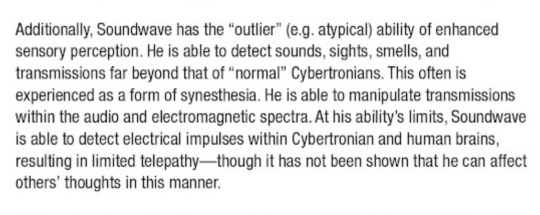
Although this seems pretty at odds with what we see in canon (Soundwave being able to discern Ravage's name without anyone saying it, the opening scene in "Another Mine" where Soundwave is picking up the other miner's specific thoughts), but it's likely because as he focused on Megatron, he learned to dial his abilities up or down to the situation as needed.
51 notes
·
View notes
Note
Would it be possible for Glit to act as a mental health therapist (like Rung), in addition to being a trauma surgeon?
I don't know. Glit is not exactly a shining example of mental health. I know some therapists aren't, but he is a very poor example for a mental patient. Honestly nobody that was in KP is in good mental health or even would recognise what that is, even in the actually good and plotty parts of the series.
If you're talking about Tumblr RPs and my @doctor-glitterbomb account or the @doccat DW account, I'd be willing to do it for shiggles (that account also has a Glit in it who is a cityspeaker and conjunx to/speaker for Fort Max) but I wouldn't write Glit into a fic as a therapist--particularly not in my Voice of Stanix series. It's definitely in the category of "things I'd be willing to let slide to help an RP move along but things that could throw me right out of a fic unless it's AU or Shattered Glass."
Glit is a serious alcoholic (except it's not alcohol, it's engex--but you know what I mean). In Kiss Players he was drunk almost every time we saw him.
In IDW verse he was forced to serve at Grindcore where they did all the really bad war crimes and that provides an explanation for his fucked up mental health that is even more compelling than just 'had issues with Megatron and got beat up a lot'.
Now, in the thing @bitegore started on AO3 that I added more to about the RavWaves in Rodion, Glit could be a therapist, but that's an extreme AU in which Glit is the natural offspring of Ravage and Soundwave and was born in Rodion. Ravage and Soundwave had no idea that spark merging causes babies and Ravi was concerned that she was getting a tumour or something. Soundwave told her there was another mind in there and she didn't know what to think because point: SW doesn't lie to her but counterpart: that is so fucking crazy! Which is how he ended up getting born on a worksite and then Shenanigans Ensued.
There is no cougaraider/Predacon hybrid breeding project in that AU and as a result of it, all of the cougaraiders are 80000% less mentally damaged. Glit in particular was raised by Ravage as his carrier and encouraged to defend himself but also to pursue his interests, meaning that he was around Ratchet practically since emergence. And as they were never slaves--not to Ratbat, not to Pharma--Glit grew up with his mama encouraging him to bite when necessary and also has much better self-preservation instincts.
8 notes
·
View notes
Text
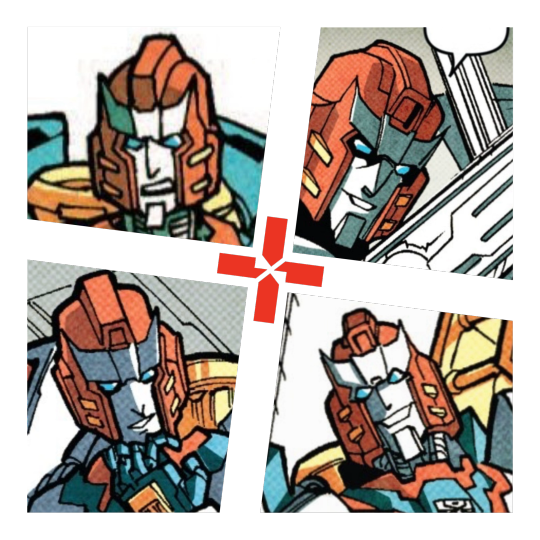
Medic, Maverick, Maniac, Murderer: Understanding Pharma
First thing’s first: I love Pharma, dearly.
In all the time I’ve spent evaluating his character, I’ve mainly focused on what can be worked out about who he is as an individual: his core sense of self, psychological drives, subjective worldview, etc.
When all else is stripped away, who is Pharma?
This treatise is the product of obsessing over Pharma, analyzing canon (and extras), and reading as many different perspectives on his character from fans across the fandom as I could find. The post is long, so for those of you who balk at the thought of reading a shortfic’s worth of Pharma thoughts, feel free to read the TL;DR (Conclusion) at the end and then decide if the full read is worth your time. Also, a premium reading experience is available in the form of the original Google Doc version.
As you read, keep in mind that this is primarily a mix of psychoanalysis, evidence-based examination, and speculation—not moral, ethical, or sociological commentary. The goal is to examine Pharma’s psychological drives and core values, and each of his appearances in the context of those. All other types of evaluation are up to readers.
Now, take your victim blaming-allergy meds (just in case); remove your black-and-white thinking caps; and leave your personal morality lenses at the door.
Psychological Drives & Core Values
Why does Pharma act the way he does? What gives him a reason to keep living? What are his personal priorities?
At the beginning of the Delphi arc, First Aid establishes Pharma as a “control freak” and someone who “thinks he’s an expert on everything.”

Now, First Aid has a habit of complaining about his bosses, but on both points, there’s canon evidence to back them both.
Expertise and Intellect
Throughout the Delphi and Luna 1 arcs, it’s established that Pharma is a skilled and brilliant doctor.
He once performed a 4-way fuel pump transplant, donating his own fuel pump in the process. (see above panel)
Later, he invented a soundbomb that left an echo laced with a virus and invented an antidote to that virus:
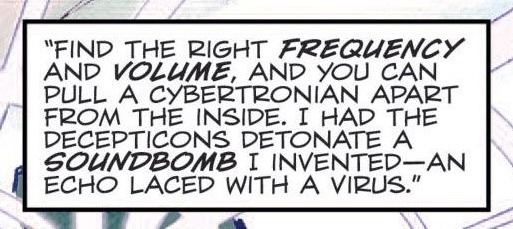
And on Luna 1, he was on the edge of finding a cure for Cybercrosis, based on the fact that Swerve was able to formulate a cure from his notes.
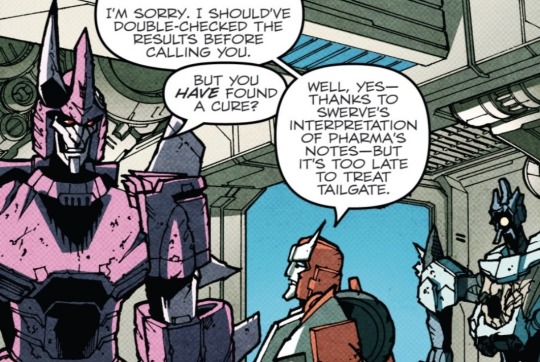
More than being a doctor, Pharma lives for intellectual and scientific achievement as a physician scientist. He feels most alive when he’s able to solve complex medical problems, and when his achievements are recognized by those whose opinion he considers important.
This is Pharma’s 'why.'
And even though he’s arrogant and enjoys praise, it’s not his primary motivation. He doesn’t need it in order to set his mind to whatever he’s interested in, although he’ll seek it from those he values most (i.e. Ratchet).
Pharma sees himself as less of a doctor, and more as a scientific innovator or medical maverick. The practice of medicine is primarily a catalyst for his creativity and intellect; it’s not an end in and of itself like it is for someone like Ratchet or First Aid.
First Aid’s observation of Pharma can be better phrased as, “[Pharma] thinks he’s an expert on everything medical”—because he’s not so driven by achievement and admiration that he’ll grovel at the feet of strangers and get good at something he doesn’t personally find interesting. The only time we see him express a desire for praise is when he’s around Ratchet—someone he holds in high regard for both personal and professional reasons. This makes sense since Ratchet is one of the only people who can give Pharma any kind of competition within what he considers to be his area of expertise.
“Each day we go to our work in the hope of discovering—in the hope that some one, no matter who, may find a solution of one of the pending great problems—and each succeeding day we return to our task with renewed ardor; and even if we are unsuccessful, our work has not been in vain, for in these strivings, in these efforts, we have found hours of untold pleasure, and we have directed our energies to the benefit of mankind.” —Nikola Tesla
Ego
Without question, Pharma has an inflated ego, but having an inflated sense of self doesn’t automatically mean a person is a full-blown narcissist or that they are totally uncaring.
Every personality trait exists on a spectrum. Yes, Pharma is arrogant, but the presence of arrogance doesn’t automatically and completely cancel out all “positive” traits. (For fun, check out studies on Dark Tetrad and Light Triad personality traits.)
People are complex. Arrogance can coexist with genuine kindness, ruthlessness can coexist with deep compassion, etc.
Whether Pharma exhibits genuine kindness is up to each reader’s interpretation of what little canon material exists, but the point is: Pharma’s arrogance doesn’t automatically rule out the possibility of authentic “positive” traits.
Controlling Tendencies
Pharma is comfortable pulling the power card and using it to dump what he sees as uninteresting parts of medical practice on those below him:
“So Fisitron’s writing about the Wreckers’ elbows now, is he?” said Delphi’s Chief Medical Officer. “Come on, First Aid - get to it. You’ve got a Fader in Row 2 downstairs.” He squeezed the air with his finger and thumb. “He’s about this far from shutdown.” —from Bullets by James Roberts
However, there’s nothing in canon indicating he’s power-hungry in a megalomaniacal sense. He’s not Starscream or Megatron; he doesn’t seek political or social power. In fact, he seems perfectly happy hiding away in a lab or medibay by himself so he can direct all his energy toward solving issues and achieving the so-called ‘impossible’ within the field of medicine:
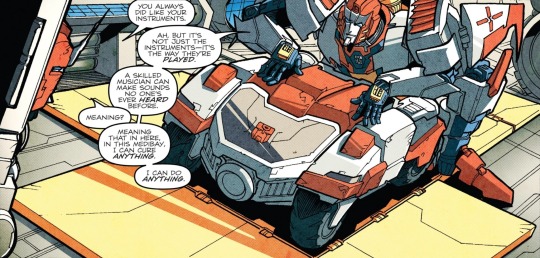
The ways in which Pharma exercises power and control are through his expertise, and his administrative/management skills. That’s it.
Self-confidence
Pharma’s arrogance and controlling tendencies don’t seem to be a mask—like he’s trying to compensate for some sense of lack (in those areas). Yes, he fears failure, and yes, he displays some insecurity when Ratchet questions his competence. But at every other point and in every other way, Pharma is unapologetically self-confident. He’s fully self-assured of his intellectual prowess and problem-solving capabilities; he knows what he knows, and he also knows what he doesn’t know.
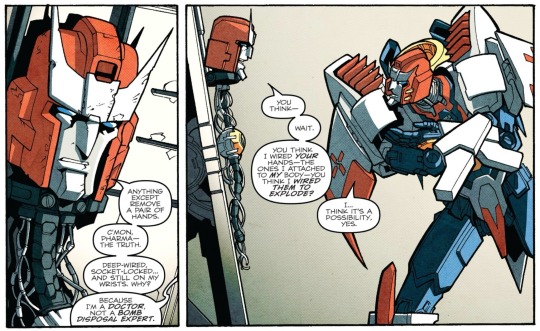
Pharma’s arrogance and desire for control don’t stem from a hidden lack of confidence or a hunger for power on its own. They stem from the fact that he genuinely sees himself as the best person for the work he does. He trusts himself above anyone else to solve problems that come his way—medical or otherwise (within limits).
Elitism vs. Superiority
I’ve always read Pharma as having an elitist attitude, but not in the social stratification sense:
elitist (adj.) relating to or supporting the view that a society or system should be led by an elite.
There’s no evidence that Pharma believes an elite class of people should hold the most power. Instead, Pharma’s “elitism” is actually an individualistic sense of superiority. It’s centered on him alone, and is tied to his capabilities as a physician scientist and surgeon.
Pharma sees himself as the best of the best and makes sure everyone knows it—sometimes through his words, but mostly by his conduct in the field of medicine. This, paired with Pharma’s natural temperament, doesn’t exactly make him socially popular—inside or outside of medicine:
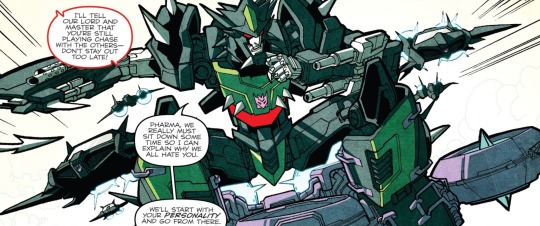
One could argue that the “personality” Lockdown is referring to was a result of all Pharma had suffered at Delphi and Luna 1, but just as easily, one could argue he was always a bit difficult to get along with, and that his traumatic experiences merely magnified his already-present psychological patterns. Personally, I like the latter interpretation because it’s a flaw that makes Pharma a more interesting character no matter his mental state.
Everyone reacts differently to real and perceived social rejection. Some are so concerned about it that they’ll try anything to belong; others genuinely don’t care, and they continue as usual; and still others cope by shifting their mindset and developing a sense of pride in being an outsider.
There’s no evidence for this in canon, but I believe it’s within reasonable characterization boundaries to headcanon Pharma as being in the second or third category.
With either of those two mindsets, a sense of superiority can develop, or even be an inciting factor. Either someone sees themselves as genuinely superior to the majority and doesn’t mind when this alienates them from people, or they convince themselves they’re superior because the pain of accepting they were rejected for who they are is too much to handle.
Whatever the case, the point is, having an “elitist” attitude isn’t necessarily rooted in a sociological or ideological belief. Sometimes, individuals just see something in themselves that—to them—justifies a sense of personal superiority. A quick glance at Pharma’s canon appearances makes it clear he holds such a view of himself, at least to some degree.
Morality and Compassion
When Pharma first shows up in canon, he’s working at the New Institute. A lot of questionable things took place there on a regular basis—things Pharma would have been aware of, to some degree. However, his presence at the Institute doesn’t automatically mean he agreed with everything happening. Depending on how strongly someone feels about something, some people are content to disagree in silence. Not everyone who seeks employment considers it a priority that the establishment they work for aligns perfectly with their moral values. After all, there are other reasons to take a job: financial benefits, exclusive educational and career opportunities, pure convenience, etc.
I’m not here to say either way whether Pharma’s willingness to turn a blind eye to the events at the New Institute was wrong or right; that’s up to each reader to decide for themselves. However, Pharma’s choice to remain employed at the Institute for some time can say something about him as a character: his priority as a doctor and person is not to take care of everyone he encounters, or to act as some kind of moral or ethical authority.
This isn’t to say Pharma won’t ever stand up for something he regards as right or push back against something he sees as wrong, “off screen.” It’s just that everything in canon points more to a tendency to choose his battles instead of acting immediately on any moral sense the way someone like Optimus or Ratchet might.
This also isn’t to say Pharma doesn’t care about saving lives, but from what little is shown of him before Delphi, it’s hard to say how much he cared. Ratchet confirms later that Pharma was an excellent doctor for most of his life, but all that tells us is he was an excellent doctor; it says nothing about his internal attitude toward his work or patients.
However, inferences can be made based on doctors in our own world:
Being a doctor—especially one in trauma care—is far from easy. It takes a lot out of a person, and there are very few people who last in the profession for a long time. Most medical professionals fall into one of the following categories:
People possessing a strong will that’s coupled with an unwavering passion for taking care of others (the public’s favorite)
People who naturally have, or develop, an ability to switch their empathy off and on at will, or build walls around it—also possessing a strong will (the ideal)
People who naturally have a limited capacity for empathy (the one the public hates to acknowledge)
People with a strong social and professional support system (the necessary, but underutilized and underappreciated factor)
Of course, even if a person has one or more of the above, burnout can and does still happen, but individuals who have at least one have the best chances of surviving and thriving amidst the demands of the majority of medical professions.
As far as is shown in canon, Pharma never had a strong support system—either circumstantially or by choice—so something else was keeping him in medicine.
Pharma shows concern for both Tumbler (Chromedome) and Hubcap:
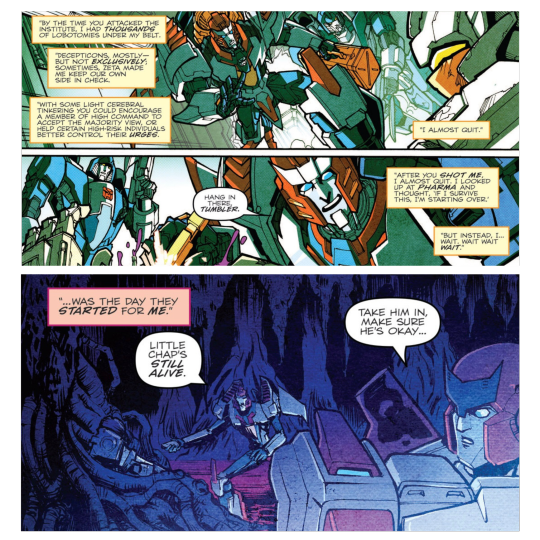
But even though he obviously cared enough to step in, neither instance makes a strong case for a capacity for empathy beyond the “average” or “norm.” Performing a job well is a lot different from being personally invested in the work.
Based on everything up to this point, and this later comment from Pharma, about Ratchet…
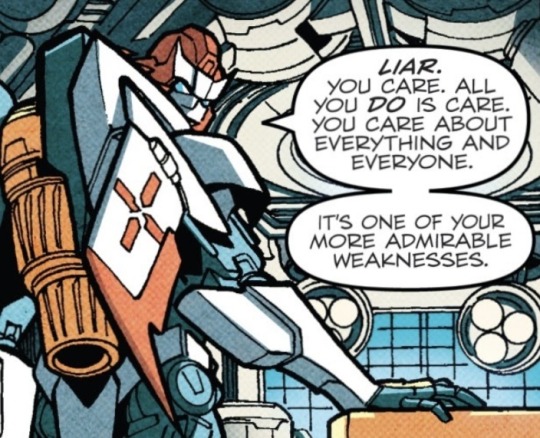
…Pharma has probably never shared the same I-care-about-everything-and-everyone view of the world. Instead, it’s more likely that Pharma holds a more rational view of his work and patients.
One of the first things learned in medicine, especially in trauma medicine, is that you can’t help or save everyone, and to hold yourself to that standard can destroy you quickly if you have a certain temperament or lack healthy boundaries for your empathy.
“There are times when it may seem as though I view sick or injured people not as living, breathing humans with feelings and emotions and people who love them, but simply as cases, as problems to be solved. And that is absolutely true. It's not that I don't have empathy, but the hard fact is that as a doctor, and especially as a trauma surgeon, too much empathy can get in the way of your job and cause you to make decisions based not on sound medical judgment but on your own emotions. Sure, I've seen things that even years later can still make me choke up when I think of them: a little girl shot and killed, a shattered young Marine who shouldn't have died but did. But you can't choke up in the ER or the operating room. To be effective as a trauma surgeon, you have to put a layer of Kevlar around your heart.” —Dr. Peter Rhee, Trauma Red: The Making of a Surgeon in War and in America’s Cities*
Pharma may have learned this difficult truth earlier than Ratchet and developed a practical way of managing his empathy that comes across as “cold.” He may have always had an ability to put up walls around his spark. Or, he may have always had little to no capacity for empathy.
The fact that the morality lock on Tyrest’s portal prevented Pharma from passing through proves he felt guilty for what he’d done, and JRO confirmed this. Therefore, it’s safe to assume Pharma had some level of empathy for his former patients, suffering moral injury when he felt he had no other option but to start killing them.
Still, looking at Pharma’s psychological drives and his behavior throughout canon, it’s clear compassionate care and morality are subordinate to his other values and interests.
*I highly recommend this book, and learning about Dr. Rhee in general. He’s a huge inspiration of mine, and one of my main sources of inspiration when writing Pharma. Level-headed and capable, strong-willed, selectively empathetic, an excellent scientist, etc. He lives for the thrill of practicing medicine both on the floor and as an expert in his field who pushes trauma medicine to new heights through his research. He also takes great pride in his hands. Seriously—the man spent an entire paragraph and a half talking about his “good hands” and how they were one of two reasons he decided to go into trauma surgery. The other reason was that he “liked action and excitement, liked the feeling of being able to walk into a tough situation and take control.” (Sounds familiar…)
Delphi
First thing’s first: we don’t know how much Pharma did or didn’t know about the DJD before agreeing to take the Delphi assignment.
That far into the war, he would have known something about the DJD and their ways of terrorizing traitors and Autobots, but for whatever reason, he took the assignment anyway. Perhaps Prowl assured him the situation on Messatine would be monitored and that the security team would be enough. Perhaps he underestimated the DJD’s capabilities, or scale of territory, and thought he would be able to handle things on his own. Perhaps Prowl gave him no choice. Maybe it was all of these and more.
Whatever the case, according to JRO, Pharma didn’t hate Delphi before the incident with the DJD.
Word of god remains a touchy subject in fandom, but in this case, it’s important because it says two things:
The DJD left the Delphi medical team alone for some time.
Being on the edges of DJD territory didn’t automatically mean isolation and harassment by their hand.
On the second point, First Aid was free to come and go from Messatine as he pleased, seeing as he attended a medical conference at Kimia five years into his assignment at Delphi:
Five years ago [mid-Delphi assignment], the leader of the Wreckers had cornered him at a medical conference at Kimia, the space station that doubled as a weapons research facility. —from Bullets
And five years after that, he was able to not only contact Springer without delay about one of Agent 113’s bullets he’d discovered in an Autobot badge…
He raced upstairs to his computer terminal and typed in a certain frequency code for the second time in his life. A face appeared on the screen and grinned. “It’s me,” said First Aid. “And you're never gonna guess what I’ve got for you..!”
…but he was also able to meet up with Springer to hand off the bullet:
“Your friend has a funny way of making contact,” First Aid had said when he’d got in touch three days earlier, and he was right.
It’s not known if this handoff happened on or off world, but either way, the DJD didn’t interfere.
At some point, Tarn set his sights on Pharma and the Delphi team. Knowing the DJD, one can only imagine what Tarn used to show off his team’s capabilities and convince Pharma the best option was to cooperate.
In striking a deal with Tarn to keep the DJD away from Delphi, Pharma established his territory and ensured his continued security and the safety of his staff. As long as Tarn got his T-cogs, Pharma could continue on in relative peace. He could work his magic on bots that ended up at Delphi, carry out his management duties, and work on whatever projects or research he may have been conducting in his free time.
For whatever reason, after he first came into contact with Tarn, Pharma didn’t call for help. Communications were still operational, as Pharma wouldn’t have suggested contacting High Command about the Duobots if the team was aware of any comm malfunctions:
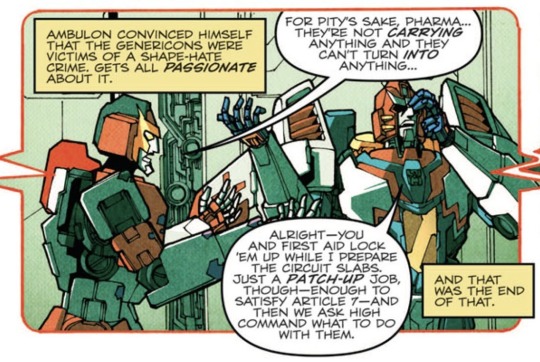
Also, First Aid later confirms that communications were fine until the Big Bang (soundbomb detonation):
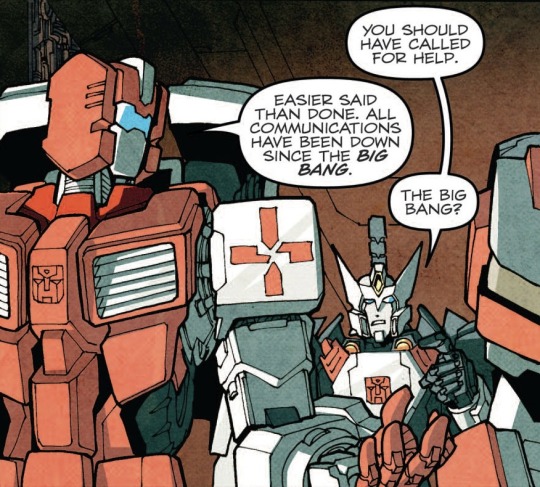
It’s always possible the DJD was monitoring the radio waves, but secure subspace frequencies exist, such as the Datalog Network First Aid used to send the datalog containing the death statistics:

Speaking of which, assuming First Aid sent the datalog with the statistics right when things started to get ‘weird,’ and before the Big Bang shut down comms, it only took—at most—a few days for them to reach Ratchet and Swerve on the Lost Light:

But back to Pharma not calling for help: for all of Prowl’s intel, contingency planning, and fretting over the security of Autobot territories, I find it hard to believe he would have stuck an Autobot medical team on the fringes of DJD territory without giving them some means of securely contacting the outside in case of issues.
But even if Prowl didn’t give Pharma a secure way to contact him or anyone else, and even if Pharma was convinced the DJD was monitoring regular communications, there were other ways he could have reached out for help. After all, the team wasn’t alone on Messatine. Like Pharma said, Prowl continued to send bots to defend the nucleon mines:
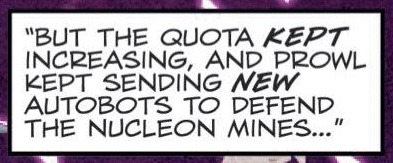
The Autobots had been mining nucleon for millions of years at this point, so I doubt the mined nucleon was just sitting in storage on Messatine; shipments of the stuff would have been sent off-world to wherever the Autobots needed it. Why not send a message for Prowl with someone leaving with one of those shipments? A message meant only to be sent over a call when absolutely certain they were out of range of the DJD’s potential monitoring.
Or, why not order in off-world medical supplies and send a message back with the delivery bot(s)?
There are two possible answers to this. One takes into account JRO’s word on the subject; the other is more intricate and speculative on my part, but it leads to the same place. So whatever your stance is on the validity of word of god, there’s an answer for you.
Answer one (word of god)
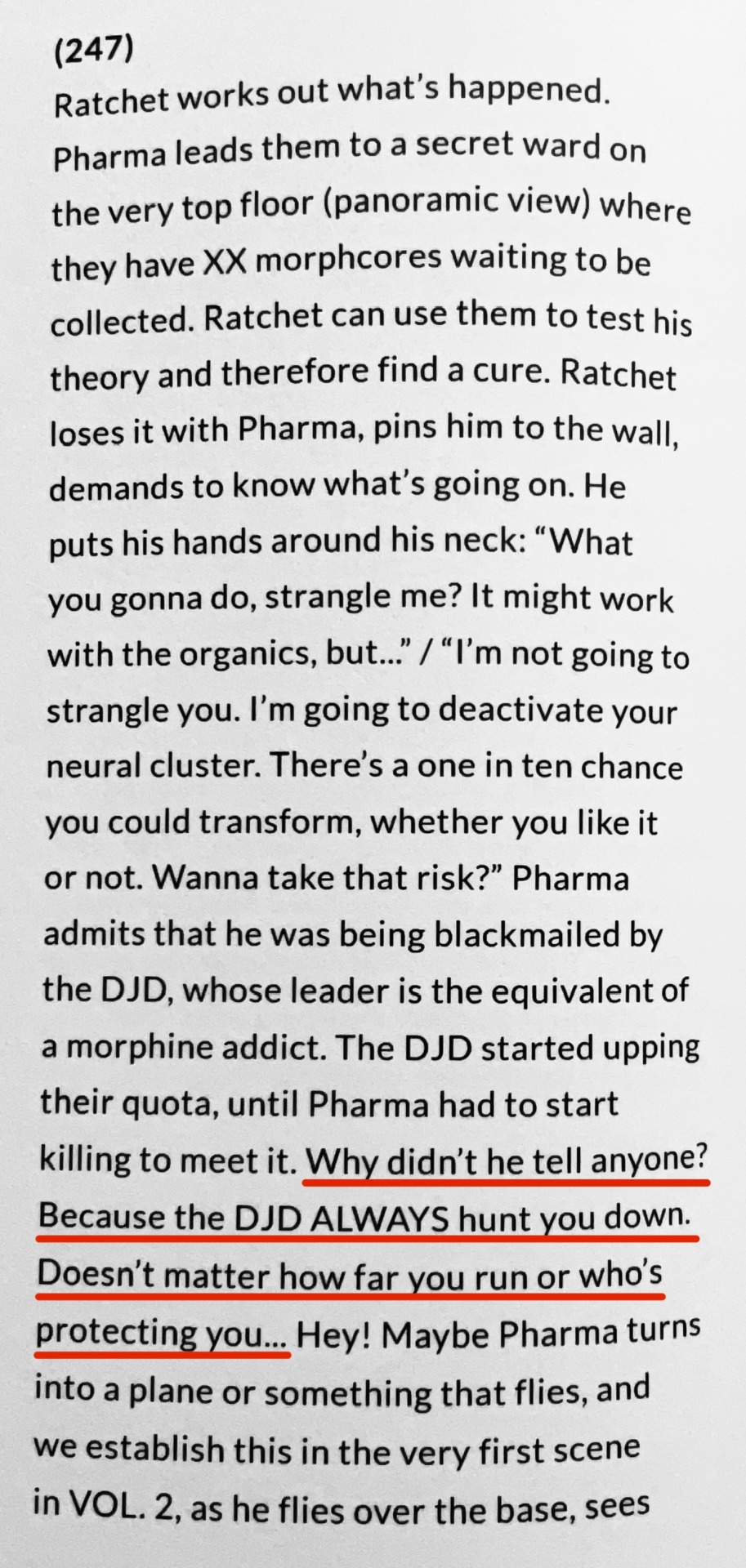
Simple as that. Pharma was aware of the scope of the DJD’s capabilities and relentlessness, and determined he was trapped prey.
Answer two (no word of god)
There are a few possible reasons Pharma didn’t call for help right away:
He was convinced all his other options would take too long and/or would still lead to him being put under suspicion. After all, being found to have harvested even a single T-cog from an already-dead patient for the DJD could have raised concerns that would lead to Pharma being investigated and/or having a mark put on his record.
He underestimated the severity of Tarn’s addiction, and was certain he could keep up with the T-cog demand without resorting to other means of harvesting, not realizing Tarn’s quota would increase later on.
He was already paranoid as a result of whatever mind games Tarn had set in motion at their first meeting, making Pharma think escape was futile.
Word of god or no word of god, there are clear reasons as to why Pharma ended up trapped. Most likely, it was a mix of all of the above.
Whatever was going on in Pharma’s mind before, he ended up in deeper trouble. Tarn increased his demand for T-cogs, and Pharma couldn’t keep up. By the time this happened, even if he had wanted to call for help, it was too late to do so without implicating himself. He reasoned his only option was to start killing patients to harvest their T-cogs.
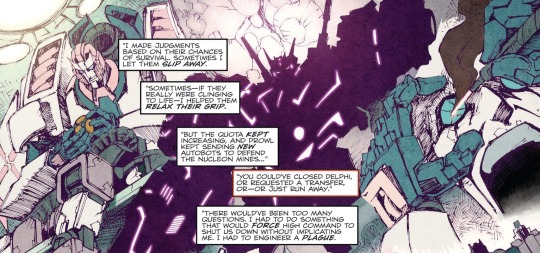
Soon, Pharma was so consumed with fretting over whether he’d be able to meet Tarn’s next demand that he didn’t have time or freedom to do anything else except worry and feel guilty. His whole life revolved around Tarn’s addiction; he was no longer in control, and could no longer enjoy whatever it was about Delphi he’d previously enjoyed. Perhaps the facility itself enabled Pharma to research cures and perform scientific miracles of medicine.
Being at the mercy of Tarn—convinced the DJD would find him no matter what—would have been pure psychological torture on its own, but also knowing that any small chance he did have of getting help would end in him losing everything would have added to his suffering. Pharma became desperate to reclaim control over his life and began planning an escape.
Now, JRO has said that Pharma didn’t originally plan to use the rust plague on the DJD…but canon says otherwise:

Of course, Pharma could have been lying to make himself look better in Ratchet’s view, but based on everything he’d been through up to this point with Tarn, it’s more likely he was telling the truth and had tried to eliminate the source of his suffering first. After all, wiping out the DJD would have been the simpler, cleaner option.
When the Duobots refused to detonate the soundbomb near the DJD, Pharma’s objectives shifted. He had to get Delphi shut down in a way that would:
Convince the DJD the shutdown was legitimate.
Pharma knew chances of escaping the DJD at all were slim to none, but he was desperate. Getting Delphi shut down would cut off Tarn’s supply of T-cogs and allow Pharma to escape Tarn’s immediate control, but the shutdown had to be “legitimate” to prevent Tarn from retaliating and hunting him down later. Leaving Tarn even the slightest chance of regaining control was too risky, so Pharma had to make sure his plan was as airtight as possible.
Cover up the patient murders.
If the truth got out about Pharma killing patients, he’d lose his medical license and most likely be put away for life. Being cut off from the practice of medicine and his intellectually stimulating work as a doctor would mean losing more than a job and a reputation. It would mean losing everything in which he’d anchored his sense of identity and life’s meaning. His refusal to consider any other options wasn’t just about ego and preserving his image as an excellent doctor; it was about preserving any kind of meaningful future he saw for himself.
Pharma needed a plan that would fulfill all of the above. Turning the engineered virus on the medical facility was the most effective and efficient solution. Anything else would have made him suspicious in the view of either Autobot High Command or the DJD, and neither of those would have ended well for him.
Because of his goal to preserve his reputation and future in medicine, he couldn’t even risk revealing anything to First Aid or Ambulon, who would have seen to his ruin. They became nothing more than loose ends that had to be tied up, and based on the fact that Pharma only prepared one vial of the vaccine, his original plan involved him being the only survivor:
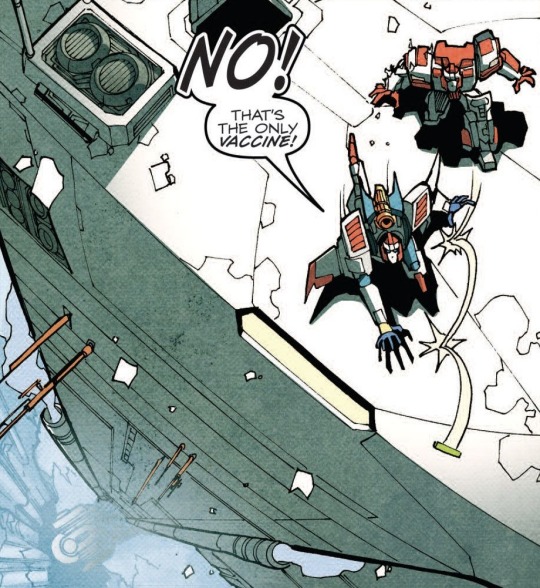
He probably would have had no problem making more of the vaccine for anyone else who survived, but he wasn’t counting on it. He wanted a totally clean slate; in letting his staff die with most of his patients, he would be getting rid of any and all evidence and reminders of his failures. He may have cared about First Aid and Ambulon before things got bad, but somewhere along the way, he decided either it wasn’t worth it to go through the trouble of finding a way to save them without raising suspicion, or he didn’t want to risk them putting together the pieces later on.
Of course, when Ratchet showed up, plans changed.
Ratchet
Ratchet is not the kind of person who seeks first to understand or be understanding. He’s inclined to trust what’s in front of him over anything abstract, and tends to look at the results of someone’s actions over trying to find any kind of ‘why’ behind them. Also, unlike Pharma, he operates from a strong moral sense, and reacts quickly and strongly when something or someone goes against that internal moral sense.
Ratchet’s reaction to finding out what Pharma did may seem hasty and harsh, but it makes perfect sense on a human level. There is no such thing as unconditional love; everyone has personal and moral lines (boundaries), and they’re different for each individual. When the most rigid of lines is crossed, that’s it; walls go up and the offender is cut off, no matter how strong the relationship may have been.
Ratchet obviously knew Pharma well enough to think he could try talking some sense into him, but then Pharma revealed that he’d crossed one of Ratchet’s lines: murdering patients. Any willingness Ratchet may have had to try to understand vanished. By the time Pharma started trying to provide a ‘why’ for his actions, Ratchet’s moral judgment had already shut down any chance of understanding what could have possibly led Pharma to kill patients. It didn’t help that Pharma seemed totally unapologetic and outright proud of his plan. For Ratchet, the ‘why’ didn’t matter anymore. What he saw was what he trusted, and what he saw was a friend who’d become his idea of a monster.
Now, Ratchet and Pharma’s relationship is one of the most confusing IDW relationships I’ve had the pleasure and pain of dissecting.
It is notoriously difficult to determine the depth and strength of a relationship from the outside. However, I’ve decided to go ahead and address it anyway because it has the potential to provide insight into Pharma as an individual.
If I were to sum up Pharma and Ratchet’s relationship in a single word, I would use “ambivalent.” The first time I read MTMTE, the thing that stood out to me most about their relationship was the drastic differences between how they each perceived the relationship.
In one sense, there’s the idea of Pharma basically being Ratchet’s crazy stalker ex, which is tossed around in fandom a lot. While I personally dislike seeing it regardless of context (yes, even as a joke), I do see how JRO’s writing choices set things up in a way that makes it easy to superimpose that trope.
In another sense, there’s the idea that Pharma and Ratchet were always close friends, and that what happened at the end of the Delphi story was a betrayal of both sides that came out of nowhere and whose consequences were taken too far.
I disagree with both. Personally, what I see at the end of the Delphi story isn’t an obsessed ex gone mad, a sudden betrayal, or a badly executed backstabbing. What I see is a breakdown of an already-complicated and poorly-maintained relationship: true feelings being revealed, long-repressed bitterness being forced to the surface, carefully-hidden cracks being split wide open.
Most people don’t have an accurate understanding of how much or how little they truly know the people in their lives, often overestimating how well they know a person until something surfaces and blindsides them.
According to JRO, Ratchet was oblivious to Pharma’s romantic interest, and throughout canon, it’s easy to see Pharma was more invested in the relationship than Ratchet ever was.
The question is, did Ratchet ever care about Pharma at all? And if so, to what degree?
Yes, Ratchet calls Pharma “buddy” and “friend,” but the former was sarcastic, and the latter means something different to each person. Also, in light of the circumstances, Ratchet could have just been saying “friend” in response to Pharma saying it—an emotional appeal more than anything.
However, Pharma must have been aware of Ratchet’s lack of relational investment because during the confrontation at Delphi, Pharma’s first reaction wasn’t to appeal to their friendship (ex: “But you know me!”). Instead, he appealed to their shared profession:
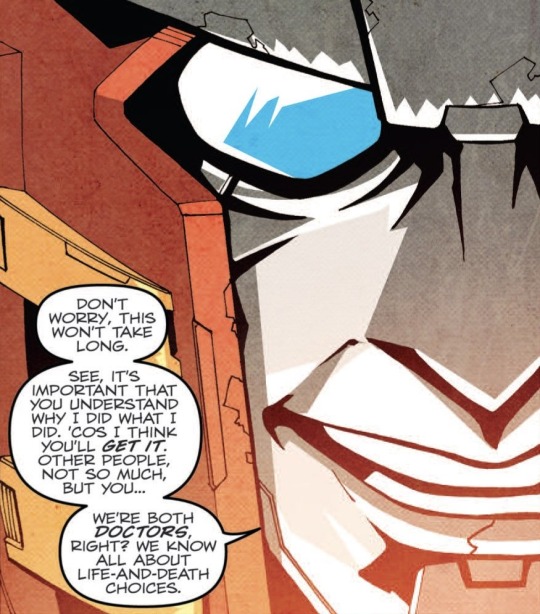
Then there’s the exchange of insults:
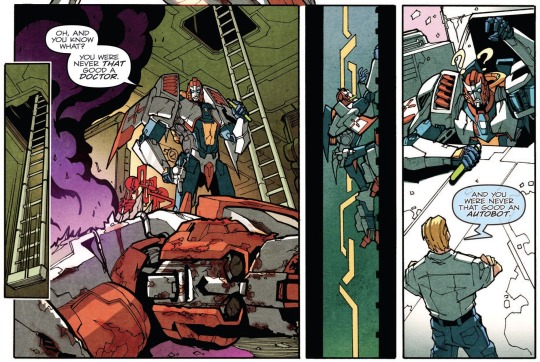
This is what I meant earlier by “true feelings being revealed.” Ratchet may have just been trying to match Pharma’s insult, but it’s unlikely it was merely reciprocal because while Ratchet is snarky at times, he’s sincere in that snark. There’s almost always some truth in his verbal jabs no matter how unserious they seem, and he’s never cruel for cruelty’s sake.
So, if Pharma saw Ratchet as an inferior doctor, and Ratchet saw Pharma as an inferior Autobot…it’s reasonable to assume there was always some deep-rooted competition and conflict preventing them from being super close.
Possible suspicion surrounding Pharma’s conduct as an Autobot paired with a tendency to misjudge the nuances of relationships could explain why Ratchet was so quick to decide Pharma was a lost cause. Maybe Pharma’s actions at Delphi confirmed something from the past that Ratchet had brushed off for whatever reason.
In any case, Ratchet seems to have been largely unaffected by the Pharma he found at Delphi. While leaving Messatine, he emphasizes that he’ll miss Pharma’s talent.

Not “who he used to be.”
Not “what we used to have.”
Just…“his talent.”
Later, on Luna 1, Pharma mentions that he and Ratchet were inseparable, but that could mean a few different things:
Best case scenario: Pharma and Ratchet sought each other out on equal terms.
Worst case scenario: Pharma followed Ratchet around.
Somewhere in the middle: the job forced Pharma and Ratchet to work in close proximity most of the time, and while Pharma intentionally ran into Ratchet more often than necessary, Ratchet also sought out Pharma every now and then.
Whatever the case, working with someone every day doesn’t tell you anything about who they are as a person, and the amount of time spent with someone doesn’t automatically correlate to how deep the relationship is or how well the people know each other. It’s not like either Pharma or Ratchet are shown to be good at expressing their personal feelings outside of extreme circumstances.
Ratchet does bring up late-night conversations of the past:

But while this indicates there was something deeper between him and Pharma, because neither of them were ever shown to be super open with their true feelings, it’s unlikely the conversations were full of touchy-feely talk. In all likelihood, the conversations were mostly medicine and war-related, with the rare spark-to-spark talk sprinkled in. Also, considering everything up to this point, one has to wonder if those talks ever meant anything to Ratchet, or if he was just digging for something that might stall Pharma’s torture.
Maybe those late-night conversations did mean something to Ratchet, but whatever the case, Pharma didn’t take the bait. He knew Ratchet was trying to stall by making an emotional appeal, and perhaps he was convinced the conversations hadn’t meant that much to Ratchet.
Looking at all of this, it’s hard to believe Ratchet ever cared about Pharma as more than an interesting work friend. But even if he had cared more than he let on, it wasn’t enough to overcome the doubts he had about Pharma’s character.
As for whether Pharma truly cared about Ratchet, I’m convinced he did, but in a mostly unhealthy way, and with a strong undercurrent of one-sided rivalry. At some point, Ratchet had been an equal and a source of challenge, and he probably listened to Pharma pretty often. It’s reasonable to assume Ratchet was one of the only people—if not the only person—able to handle Pharma’s intense temperament and challenge him in a meaningful way, providing some semblance of friendship for Pharma.
However, one last thing that stands out is that, when telling Ratchet why he’s torturing him, Pharma didn’t say anything like, “Because you hurt me” or “Because you turned against me—your friend.” Instead, he said it was for “ruining things at Delphi” and because “you declared war on my body.”
Either Pharma wasn’t being entirely honest, or Ratchet’s friendship didn’t mean as much in the first place as he’d previously implied. It’s possible the ‘Because you hurt me’ was implied in “for ruining things back at Delphi,” but why not say it outright? Perhaps it was a fear of vulnerability and admitting there was ever a relational need at all.
At the end of the day, it’s difficult to say for certain how close Pharma and Ratchet were, but it’s clear they were never on the same page and there were always barriers between them.
Luna 1
Revisiting the matter of Pharma’s morality taking a backseat to other priorities, his time on Luna 1 further underscores this. Again, Pharma chooses his battles and is unwilling to put himself at great risk for the sake of others, but a closer look at the situation with Tyrest reveals there wasn’t really anything he could have done for the Cold Construct population even if he had wanted to. It would have been him against Tyrest, an army of Legislators, and a bunch of Decepticons. Pharma knew his limits, and seeing as his goal was self-preservation, it was perfectly rational for him to go along with Tyrest’s grand scheme.
Besides, it doesn’t look like he was given much of a choice:

Although, knowing Pharma, he still would have demanded to know beforehand what he would get in return for the pain, and evidently, Tyrest held up his end of the deal since Pharma had access to the Luna 1 tech collection.
As for Tyrest’s plan to wipe out the Cold Construct population, there’s nothing indicating Pharma’s decision to turn a blind eye to it was rooted in malevolence or bigotry—just rational apathy: ‘I can’t stop Tyrest, so why concern myself with the outcome?’
Again, you can’t save everyone; Pharma had all he could do to save himself.
But it wasn’t all horrible. I would even go so far as to say Pharma found some happiness on Luna 1. Tyrest didn’t care about him, but he didn’t need Tyrest to care. Everyone else there hated him, but he didn’t need to feel like he belonged or was admired. At this point, Pharma’s only interest was Tyrest’s Luna 1 tech collection, and that meant playing nice so he could keep his reward. Back at Delphi, he probably assumed he’d never again practice medicine the way he’d loved; being brought to Luna 1 was an unexpected, yet welcome, second chance.
Even so, Pharma had his moments of cruelty. Back at Delphi, he had easily-identifiable reasons to kill patients—both the ones whose T-cogs he harvested and the 20 more he tried to kill when he shot the life support machine. But on Luna 1, he had no reason to be cruel, yet he chose to be. By this point, he’d mastered the ability to almost completely ignore or subdue his conscience.
In the case of Ratchet’s torment, one could argue Pharma only drew it out for retaliation purposes; it was personal for him.

As for cutting Ambulon in half, it was obviously meant to be as gruesome as possible, yet also quick. But personally, I don’t think it was about Ambulon; it was more about hurting Ratchet. Due to the fact that Ratchet’s identity is wrapped up in his compassion and his ability to be helpful as a doctor, one of the most effective acts of revenge would be to do something that makes him feel utterly helpless.
Also I wonder if, subconsciously or consciously, Pharma was attempting to recreate the sense of helplessness he felt back at Delphi under Tarn’s watch: “Do you see, Ratchet? Do you now understand how it feels to have control ripped out of your hands? To be totally helpless?”
Next, for some reason, Pharma was invested in the promised execution of Getaway and Skids:

He had no personal connection to either of them that would give him a reason to be interested, so maybe Tyrest told him he could perform the execution and/or have the corpses for medical experimentation. Either way, Pharma would have had a chance to use some of the tech in Tyrest’s tech collection, possibly explaining his excitement.
Of course, any chance of an execution disappeared when the final showdown went wrong.
When Pharma tried to escape to Cyberutopia and discovered he couldn’t pass through the spacebridge forcefield, he gave up. He’d been caught; he would no longer have access to Tyrest’s tech collection; Ratchet and every other self-righteous Autobot would never forgive him; and the morality lock prevented him from escaping. By all appearances, he would never again be able to engage in that which gave him a sense of meaning. He had shrunken his world down to his obsessive interest in a specialized field and one significant, yet unrequited relationship. With both of these lost, his world collapsed.
Yes, guilt played a part in Pharma’s despondency, but because he seems to have been in denial of said guilt, it’s more likely his despair was primarily due to the fact that he saw no future for himself. He had nothing left to live for.
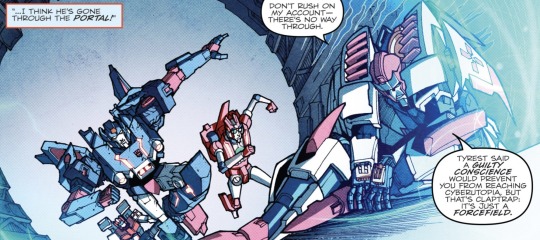
In light of this, Pharma’s flippant comments to First Aid make sense. He wasn’t being insensitive as much as he was goading First Aid. Pharma’s not stupid. First Aid had a massive rotary cannon on him, and Pharma knew exactly which emotional buttons to push to get him to pull the trigger.
Pharma wanted to die.
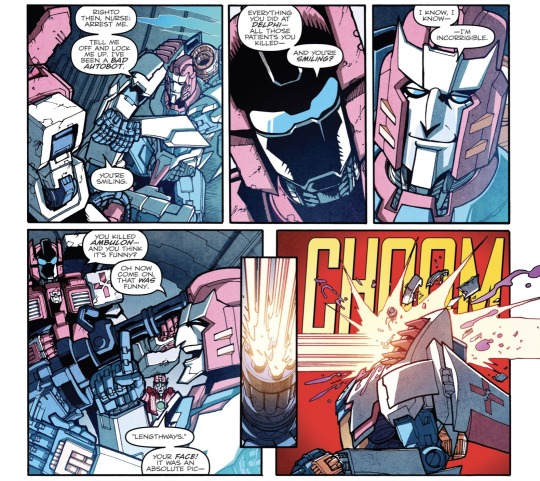
Adaptus
First, let me emphasize that Adaptus did not take possession of Pharma’s body. Instead, Pharma was the unwelcome guest:
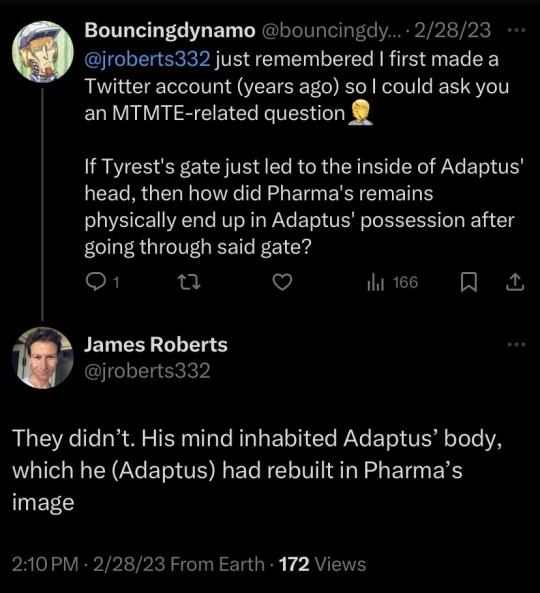
How Pharma ended up in Adaptus’ new body is a mystery, but whatever the case, Pharma didn’t pass on to the Allspark. Whether or not he had a choice can only be speculated.
First Aid had blasted Pharma’s head clean off, so whatever happened must have been related to the spark. Perhaps some residual spark energy was trapped in a body part that Adaptus repurposed, leaving Pharma tethered to the new body unwillingly.
Still, Pharma managed to assert his will and override Adaptus for a brief moment. Considering Adaptus was basically a god, this is impressive.
Based on Adaptus’ surprise at being interrupted, it seems he didn’t know Pharma was there. Why Pharma hadn’t tried to assert himself sooner is a mystery. Maybe Adaptus’ scheme was entertaining; maybe Pharma actually liked the company; or maybe he’d been waiting for an opportunity to get revenge on Tyrest for everything done to him back at Luna 1.
Sure enough, just like with Ratchet back on Luna 1, Pharma’s vengeful streak came out as soon as there was an opportunity.
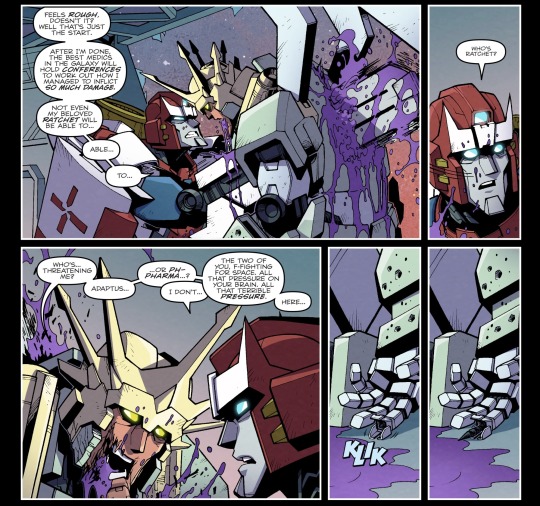
Unfortunately for him, this left him vulnerable, and Tyrest took advantage of the confusion:
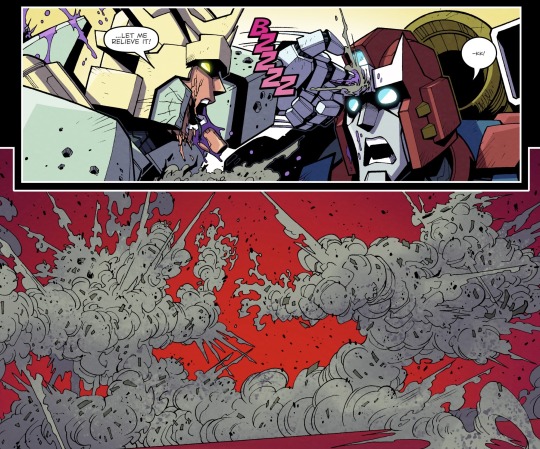
Conclusion
When someone reduces their world to narrow personal interests and one or a few very special people, their grip tightens around what little they have. They often become obsessive and possessive of the few things that make them feel alive, and their view of the world becomes increasingly more subjective and detached from the outside world. Pharma seems to have fallen into this trap.
Even so, in the context of the circumstances, several of the decisions he made were rational—even if coldly so. Oftentimes, “extreme” rationality and self-preservation are villainized in fiction, and characters like Pharma who don’t automatically put themselves at great risk for anyone and everyone are villainized, or at least looked down on. Their choices are often regarded as less human, but rationality and self-preservation are just as human as compassion and self-sacrifice.
Ultimately, Pharma was trapped and pushed over the edge into “insanity” by Tarn’s cruelty, but his own choices made from a place of pride determined how he fell, and how far he fell. It was a perfect storm of Tarn’s mind games and Pharma’s intellectual arrogance, excessive self-confidence, obsessive nature, and stubborn grip on the kind of future he wanted for himself.
Pharma is yet another Icarus who flew too close to the sun and paid dearly for it, and while JRO/the narrative could have given this Icarus better wings, that doesn’t change the fact that he chose to fly so high.
***
Many thanks to anyone who made it to the end of this monster of a post.
-tosses a Rodimus Star at you-
#idw transformers#idw1#maccadam#MTMTE#lost light#idw pharma#pharma#tf idw character analysis#tf idw meta#dr. fancy hands#nova’s nerding out again
703 notes
·
View notes
Text

Thinking about this line from the Transformers Annual. Instead of saying “me!” or being defensive, Bumblebee says “nice people”—even though perhaps back in the time Optimus and Pyra were talking about, Bumblebee was likely being genuine. However this line denotes that at least at this point in time, saying things like that is a conscious decision to be “nice”. It’s a conscious facade, and part of why Bumblebee works so well with Starscream in phase 2–they’re both stuck between who other people perceive them as, and who they are and become as they heal post war. As they do their best to unite neutrals, autobots, and decepticons, or colonists and cybertronians. Part of why they both end up failing to lead is BECAUSE their reputations precede them in such a way, but that doesn’t mean they can’t still push towards their wish to see Cybertronian become home once more, and being able to be themselves and rest with each other. Bumblebee and Starscream are a lot more alike than many people—both within and outside of canon—think.
#the evil starscream and the good bumblebee are conscious facades and how do you avoid falling back into those mechanisms that helped you#cope during the war but no longer help as they used to now#on top of it people expect the same from you and for it to have the same effect#starscream#bumblebee#starbee#my writing#transformers idw#transformers meta#transformers#tf idw#transformers bumblebee#bumblebee transformers#starscream transformers#transformers starscream#till all are one#taao
586 notes
·
View notes
Text

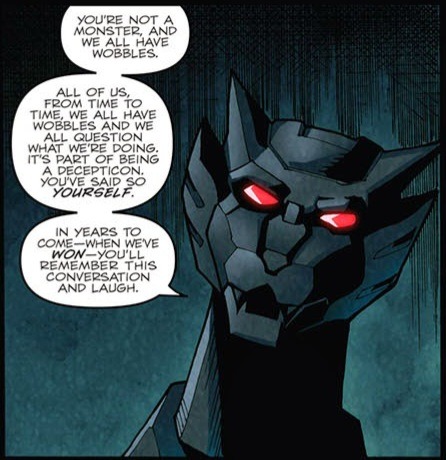
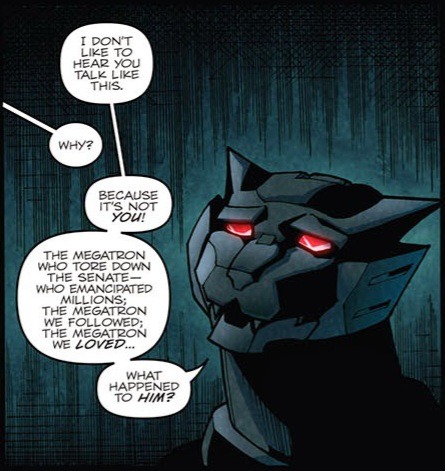
the way that ravage clearly loves and idolizes megatron genuinely makes me ill you have no idea. like this is someone who clearly still adores megatron despite being betrayed by him. and on the other side, the way megatron interacts with ravage in this entire scene is so,,, he's tired. he isn't at all what ravage idolizes and he knows that. he doesn't know what he is anymore but he's not the valiant savior ravage needs and wants him to be, and he Knows it.
ravage is clinging to a version of megatron that no longer exists (or maybe never did in the first place, and only existed in ravage's mind) and megatron no longer has anything to cling to so he rejects his past completely. these two make me ill.
#transformers#maccadam#maccadams#blight rambles#transformers idw#idw transformers#transformers meta#mtmte#more than meets the eye#lost light#tf idw1#idw1#idw tf#tf idw#megatron#idw megatron#tf megatron#mtmte megatron#ravage#tf ravage#idw ravage#mtmte ravage#im still not a fan of how megatron's character was handled in mtmte but i whenever i think of him and ravage they make me want to throw up#i would of very much preferred if this was framed just a BIT to the left. just a slight bit. and ravage brought up soundwave's efforts to#change the decepticons for the better and asked megatron to come back as an offer to “try again the right way”#which is what soundwave wants to do bc i would of LOVED to of seen how megatron would of reacted to that#idk. many thoughts#because ravage isnt stupid. he says outright that megatron was a tyrant. this isnt some blind belief that megatorn was a hero during the wa#it was a begging for megatron to return to what they were supposed to be at the start of the war.#idk im tired and words are weird. i just think about them a lot
337 notes
·
View notes
Text
my lifelong special interest in sonic the hedgehog has both a very sincere side (those little animal characters are so cute! these games are fun! yay bright colors and the power of friendship!) and a side I can only describe as "morbid fascination with all the ways a long-running franchise can try to do a million different things and none of them are good or right or nourishing to the human spirit"
today, I would like to take you all on a special journey through the latter !
did you know that, at a conservative estimate, there have been attempts to create a recurring love interest for the blue man himself no less than FIVE SEPARATE TIMES. MORE IF YOU COUNT THE ONES THAT WERE NOT SUPPOSED TO LAST
below is Madonna (left) and Breezie (right). Madonna was a damsel in distress type character Sonic would've been saving in an early draft of the OG 1991 game. Breezie was a temporary love interest in the 90's cartoon, Adventures of Sonic the Hedgehog, who seems to be inspired by the scrapped Madonna concept.
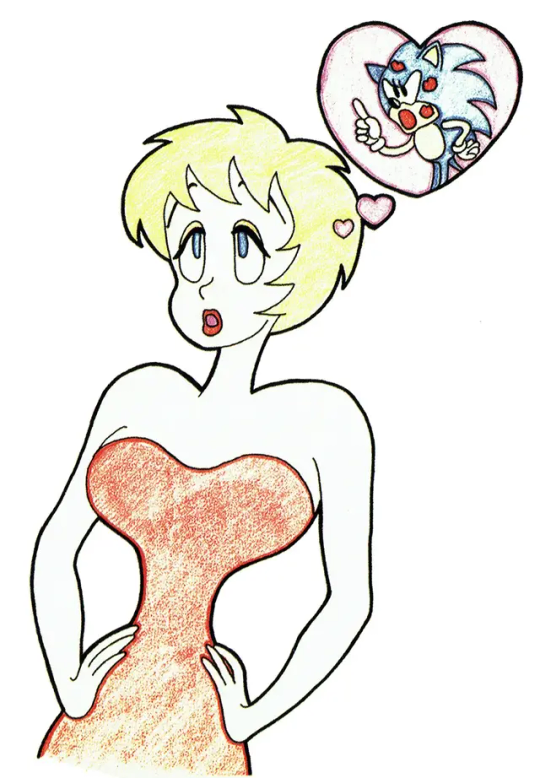

another scrapped love interest was Tiara Boobowski, who was at one point in development going to be a playable character in Sonic X-treme, a game intended for release in the 90's, though it never materialized. it seems her story went through a few different iterations before development ceased. she has the dubious honor of being the first "princess" character created for the purpose of being Sonic's love interest, which would be revisited at least two more times in other contexts.
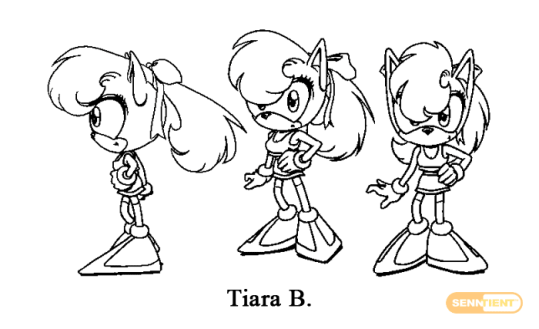
the first love interest to stick around for a while was Princess Sally Acorn, developed from the squirrel critter design in the early games into a major supporting character in the 90's cartoon Sonic SatAM (left), then kept around in various iterations in the comic book spin-off series published by Archie Comics (middle + right) until the series' end in the mid-10's. she was in an on-and-off relationship with Sonic over those decades, for better or for worse, and they had by far the longest running romance arc out of all of Sonic's love interests to date. after suffering every romantic melodrama plotline imaginable, she was unceremoniously booted from the franchise when the rights to Sonic comic books were moved over to IDW Publishing. rest in peace, Sally, you didn't deserve any of that. at the very least for five minutes towards the end, she stopped dating Sonic and it was implied she started dating her long-time gal pal, Nicole, so she had that going for her for a little bit. counting our blessings

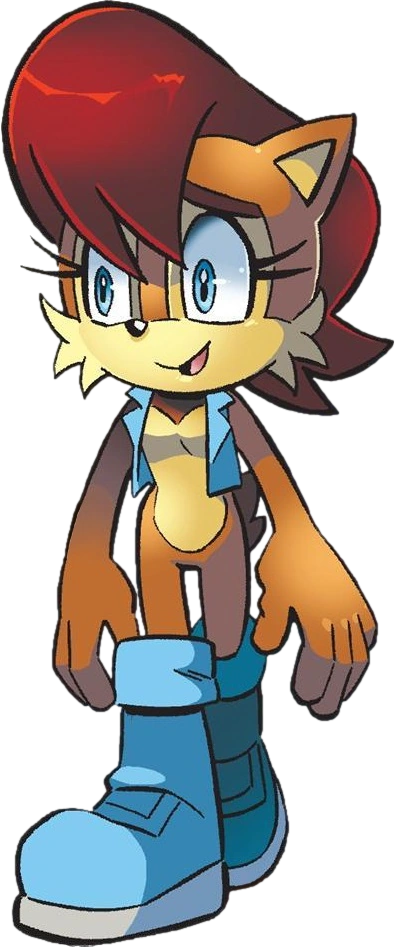
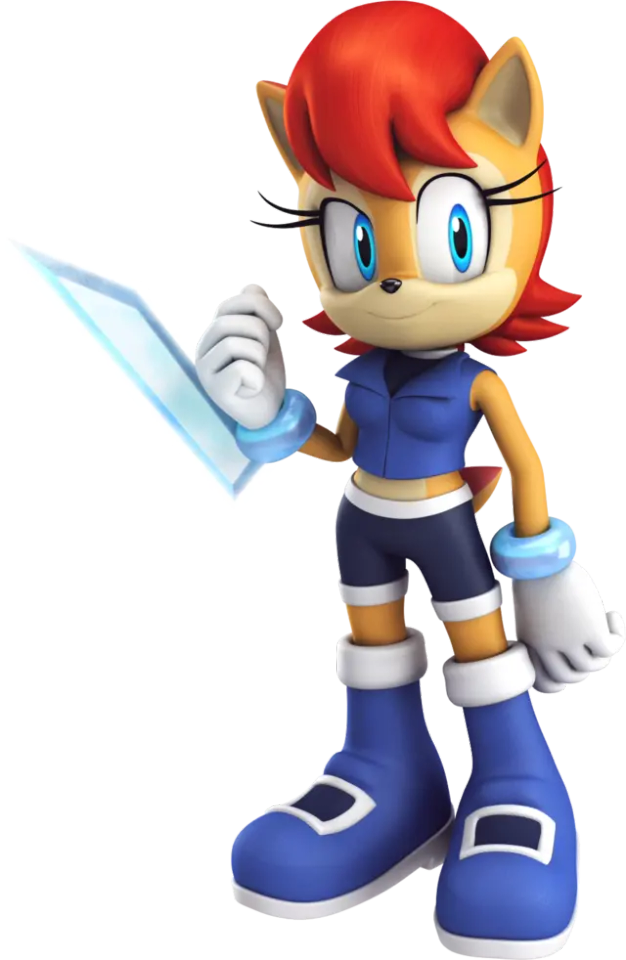
speaking of romantic melodrama, the Archie comics also gave Sonic a temporary love interest in Mina Mongoose because they wanted to write in a love triangle. there was a "main characters all grown up and starting nuclear families" future story at one point where they married Mina off to Tails instead, which somehow felt deeply cruel to both Mina and Tails. "hand-me-down love interest" is a bad, bad vibe for everyone involved

a few years on, in the mid 00's, the games were having their own weird little time giving Sonic a short-lived romance arc with new addition to the cast, Princess Elise the Third, who only showed up in the game Sonic the Hedgehog (2006) and managed to lay one singular smooch on Sonic's corpse to bring him back from the dead, disney style, before she was banished from the franchise due to a monumental amount of backlash (against both her character and the game as a whole). I'm beaming hostile psychic waves into sega's headquarters until they bring her back with better writing and none of that stupid shit. they did it with Silver, they have no excuse

and of course we finally have the one. the only. the most persistent girly of all time who's been trying to marry Sonic since 1993 and is still truckin' on in the year of our lord 2025 even though he's slippery as an eel and he "don't wanna" and there's kind of an uncomfortable age difference and reciprocated romance has over time become more or less outlawed by Sega because it never really pans out for them for some inexplicable mysterious reason. everybody's favorite hyper violent child psychic AMY ROSE !!!!
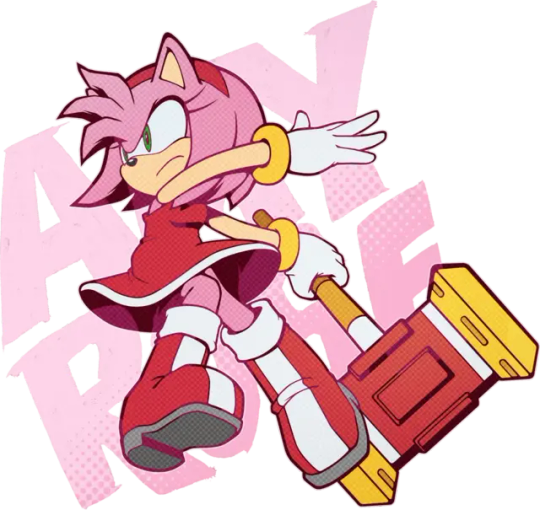
great character!! has always had so much potential to do her own cool thing if only they'd let her!! if they don't drop the stupid "kinda love interest, kinda not" aspect of her character soon, I'm going to start CRYING BLOOD!! FREE HER <3
anyway honorary mention also goes to Blaze the Cat (left, game continuity, still active), Bunnie Rabbot (center, Sonic SatAM + Archie comics, goners with the Archie series cancellation) and Fiona Fox (right, Archie comics, also goners, same deal), who, while not introduced as love interests, have all been put into some kind of romantic context with Sonic at one point or another just because
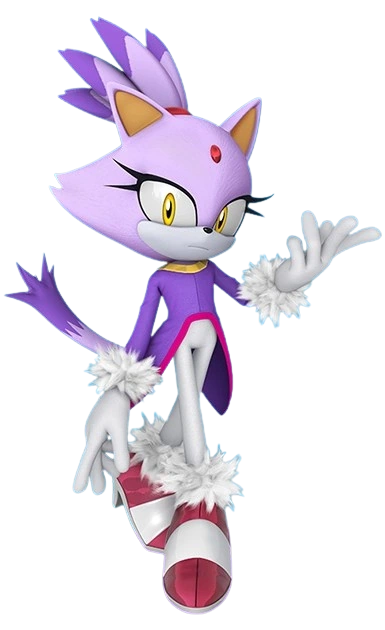
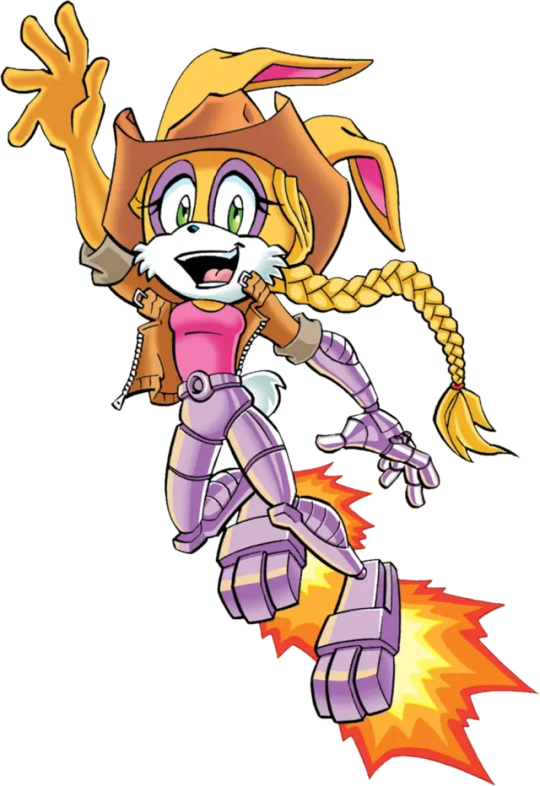

(and also while not really relevant to the topic at hand, I would be remiss not to give a special shout-out to the multitude of male characters who were most likely never intended to have any romantic connection to Sonic, but because this series is shonen anime inspired and the rivalries get crazy, our boy still has to hear shit like this on the regular)

and like, you know I've probably forgotten some more girlies out there, too. Sonic the Hedgehog has been pelted with potential romance arcs since the day he was created, and I'm sure there are more out there lost to time/my shoddy memory.
and it's just ... so profoundly morbidly funny to me. unstoppable force (heteronormativity) VS immovable object (misogyny). countless futile attempts to convince kids across the world that a cool guy like Sonic TOTALLY GETS GIRLS, DAMN IT, HE IS FULFILLING HIS HETEROSEXUALITY QUOTA, WE PROMISE, combined with this utter disinterest in sufficiently developing female characters who can effectively fill that role. even Sally Acorn, who was put through hell in the spin-off comics for DECADES serving as the designated narrative romantic punching bag, would eventually go gentle into that good night without fanfare because porting her into a new continuity would just be so much worrrrrk ughhh she's not even Sonic's girlfriend anymore so whateverrrrr
though as much as a massive L as this is for women, at the very least these poor girls are taking the obligatory main character romantic subplot down with them. taking one for the team here. Sonic is so fast and so smooth, those cringey romance plots just slide right off the wind screen of his character and I at least love that part. I love that it never works out and our protagonist remains utterly unpairable. and I hope nothing ever sticks. and I hope the current staff continue to get better at writing female characters just for the sake of having some cool girls around who are interesting in their own right. and may a thousand more cynical, sexist, half-assed attempts to awkwardly shoehorn romance into stories where it doesn't belong wither and die just as spectacularly, booyah

#deerchatter#you know i'm spiritually unsalvagable because i collect discarded sonic love interests like beachside rocks#it's so fascinating to me. what is a desirable woman to an audience of 12 year old boys?#is she nice? mean? does she need you? is she helpless? can she kick ass? but not too much right?#does she hold you back? does she make you look good? is she girly? a tomboy? but not too much?#are you friends? do you respect her? do you even really want her around?#i was never even an archie comics fan but the whole sally acorn ordeal haunts me#all the archie-only characters were dropped in the move to idw to re-focus on the game canon but sally was different#almost as much of a protagonist as sonic! mistreated in a thousand ways by a thousand writers and then just. gone#one of these days i'm going to start writing insufferable meta fiction about mistreated girl characters in childrens franchises#and it's going to be so self-indulgent and soap boxy and that's a threat <3#long post
99 notes
·
View notes
Text
Silver the Hedgehog: Refugee of a Future Lost to Time

I don’t find myself thinking about Silver a lot, and that’s a bit of a crime honestly. But when I do, I’m struck by how in the weeds I become about his existence. Silver the Hedgehog starts as a young boy with psychokinesis* born into a world on fire. He wants to fix it but doesn’t know how.
*worth mentioning here that while Lore™️ consistently refers to Silver’s power as psychokinesis (the ability to control minds and conjure specific actions from people), his powers in practice are actually much more aligned with the definition of telekinesis (the ability to control objects and manipulate their movement in space).
He despairs with Blaze over the life they live and the nerve-ending cycle of it all, then meets a mouthless hedgehog who claims to have all the answers. In his desperation, Silver clings to the sliver of hope he provides… and this is something I think we often find ourselves forgetting.

Silver never had the power to travel through time—at least, not independently. Mephiles did. Later on, the game establishes that two people can open a time portal through the power of our favourite plot device, the Chaos Emeralds, via Chaos Control.
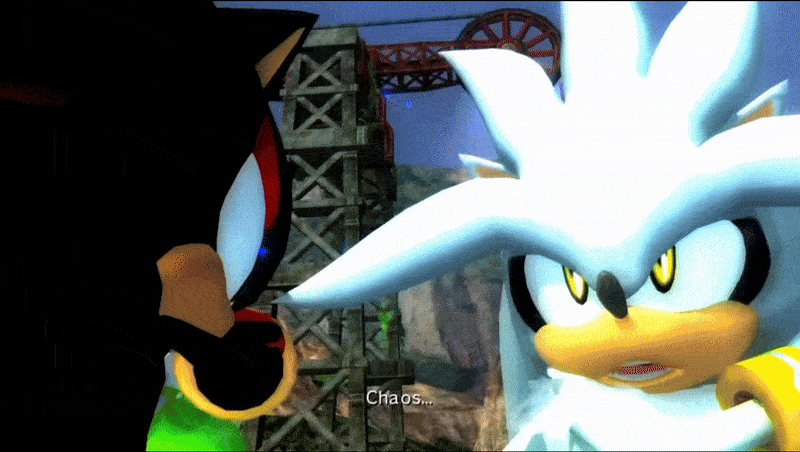

Through Contrivance’s Paradise, Silver (and company) were just… able to time travel because that’s what the plot needed, but Silver, as an individual, never had the embedded power to travel through time.
I’m still endlessly annoyed that this anniversary game didn’t shoehorn an excuse to bring back the time stones from Sonic CD, but alas.
Silver was barely a figment in the canon imagination after Sonic 06. His appearances in Rivals are just excuses to reintroduce him into the series (because, remember, Sonic 06 removes itself from the timeline by the end of its story), and his appearances there don’t mention his time travelling at all. He appears (for kinda no explainable reason) in Generations, but then… nothing! Absolutely nothing… for FIVE YEARS.
And yet, in 2025’s mainline canon, Silver is just the Time Traveler™️. Since Sonic 06 never happened, the nature of Silver’s time travel beyond Sonic 06 has always been vague, at best.
The running logic seems to be that Silver, through no intentional act of his own, is sent into the past when something catastrophic needs to be stopped. Silver is a being somehow tied to the fate of the world. Silver has been chosen by Time itself to protect it… which is something I kind of love, to be honest.
If Sonic is just a hedgehog who showed up one day and decided to do good, then Silver is a sort of divine guardian of his travels.
It’s taken canon a bit of time to settle into this interpretation, but the IDW comics have taken pretty much any opportunity they can to establish this fact as fact.
In issue 3 of the Sonic Forces prequel comics, Silver returns from the future to warn Knuckles about the Eggman Empire’s success, which implies that Silver has some sense of control over his time travel.
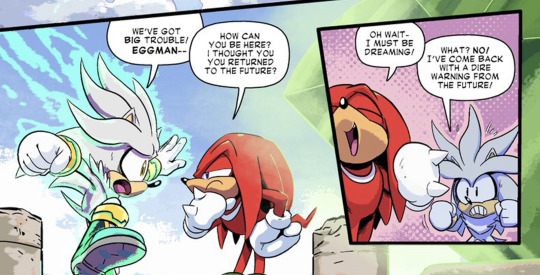
In mainline IDW 8, Silver returns to the present after winning the war didn’t save his future, under the same pretense that he can just… do that.
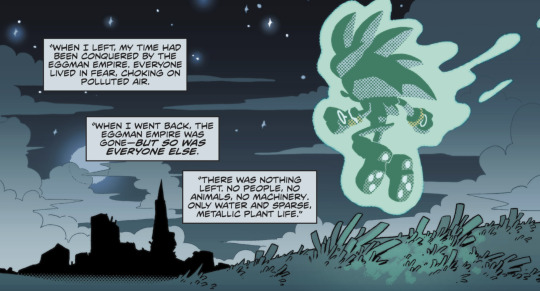
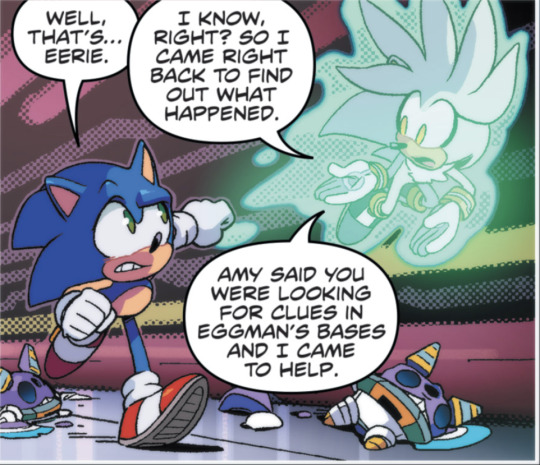
However, by the end of the Meal Virus comic arc (IDW 12-29), in a pretty monumental move for his story, Silver’s future is officially saved.
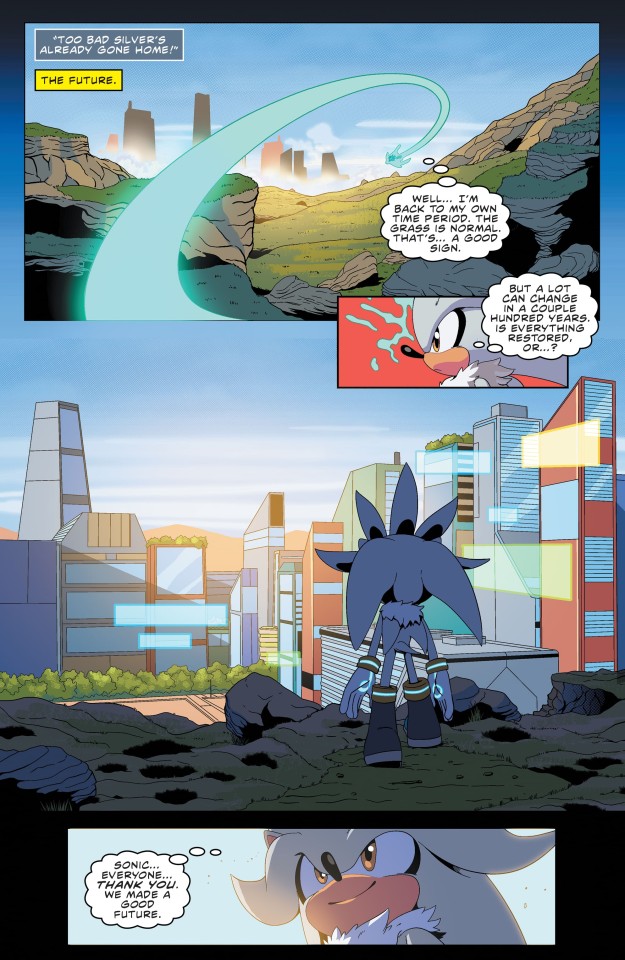
IDW 31
Now, having done the damn thing and guaranteed a Good Future™️, Silver is free to be a kid again… and for his efforts, as I intend to argue, Time rewards him…
…by sending him back to the past where all the bullshit is happening lmao. Hear me out.
In the IDW Sonic 2022 annual, Silver returns to the present, but this time he has no idea why or how*. This is when canon decides to remove the pretense of Silver having active control of his time traveling. It’s largely implied that Silver will be in the present for the foreseeable future (no pun intended).
*I’ve included the proof for this below as it’s more directly relevant to another point I’m making in a moment.
With the inauguration of Fast Friends Forever, the SEGA initiative that champions friendship through a lore-centric focus on Sonic and his friends in and out of the games, Silver’s time travel is explicitly explained as external to his control.
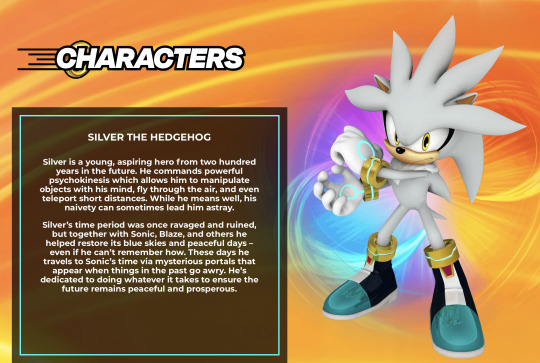
By IDW 58, Silver is roped back into the mainline plot, and it’s made abundantly clear that he no longer has never had the ability to travel freely through time.
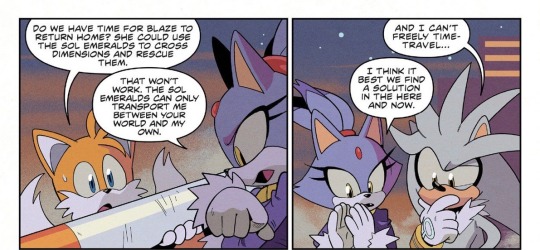
So, Silver’s arc becomes about finding his place and trying to live life without the demand of proactivity—to enjoy the moment while making the most of the life he has.
But… why? Why must he do this? Why take him down this road?
Silver the Hedgehog starts as a young boy with psychokinesis born into a world on fire. That world no longer exists.
Silver the Hedgehog became a young boy with psychokinesis born into a world dominated by the Eggman Empire. That world no longer exists.
Silver the Hedgehog further became a young boy with psychokinesis left behind by a world decimated by metallic disease. That world no longer exists.
With every trip to the past, every day saved, Silver rewrites his own life for the sake of his world—so much so that there’s nothing for him when he returns. His entire world has changed. People he might have known before cease to exist as they once were.
When Silver saved his future, he sacrificed his place within it—because once he saved his future, his future ceased to exist. Instead, a new future curates itself in Silver’s absence because he wasn’t there to be a part of it.
Returning to the IDW 2022 annual:
It seems that Time has sent him back to the place—the time—he belongs… where he has unwittingly planted his roots.
Something which Espio so elegantly points out.
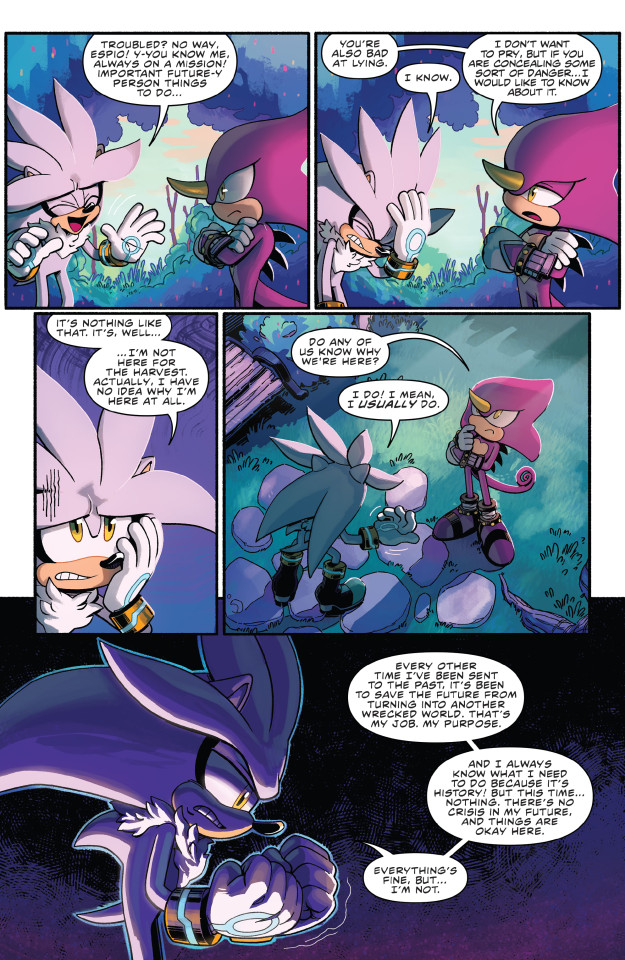
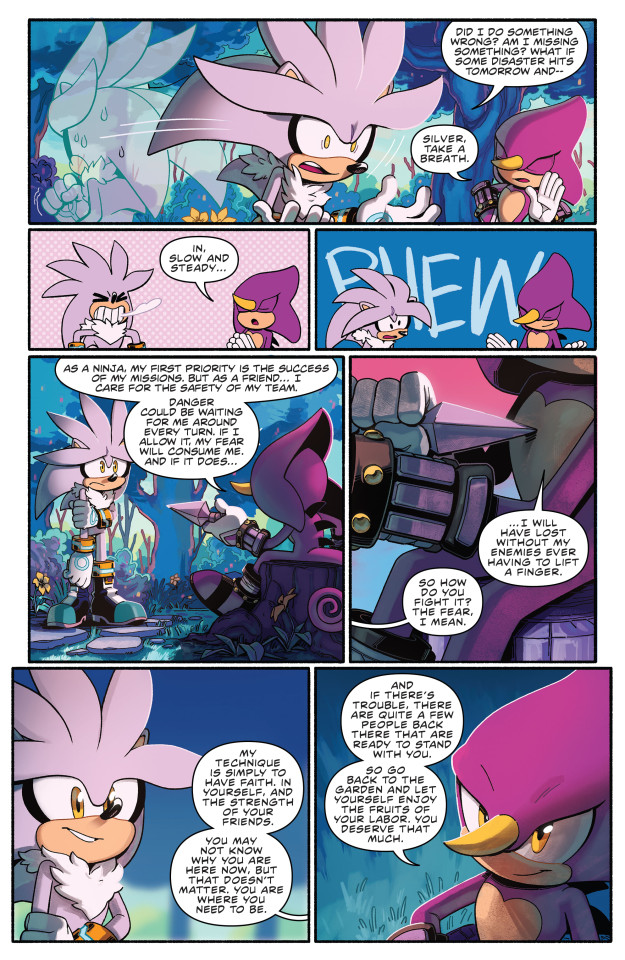
Thanks to his sacrifices, Silver is no longer the Omen of Disaster. He’s Silver the Hedgehog: the psychokinetic. Silver the Hedgehog: the kid.
He is Silver the Hedgehog: Refugee of the Future, and he deserves nothing more but to blossom in the garden of most significance to him, among the flowers he loves so dear.
#I AM BACK BABY#I LET ONE YEAR GO BY BUT COULDNT LET TWO#fr though my life is about to go crazy in a few months so imma enjoy this while I can#this has been on my mind for so long now -- hope you guys enjoy this!#silver the hedgehog#sonic the hedgehog#sonic#sth#character analysis#sonic characterization#idw sonic#sonic idw#sonic idw spoilers#idw sonic spoilers#fast friends forever#sonic 06#mephiles the dark#time travel#espio the chameleon#<< the GOAT btw#storytelling#molinaskies#dynamic characters#sonic character analysis#meta analysis#ソニック
70 notes
·
View notes
Text
"Why Would You Bother With Me?" - An Analysis of Kitsunami, 09/07/2024
tw: major discussions of abuse, the cycle of abuse, re-traumatizing situations, toxic and abusive relationships (non-romantic)

so like when I first read this panel my reaction was just to joke with Cori that this is a "get out of my school" moment (iykyk) but I've been thinking about it a lot recently because I... couldn't remember any specific beef Kit had with Tails?
Last we saw of them interacting one-on-one, Tails was talking Kit down from fighting, and Kit's beef with the squad later was more with Sonic than him. Tails didn't take down Surge in #56 or even affect the fight in any way, and Sonic was the one who told Kit that Surge was dead beforehand. At least that I could remember, so I went back to those comics. Indeed, in #56 he shows no animosity towards Tails specifically, nor when he talks to Surge in #55.
Then I went back to #54.
See, he does seem to blame Sonic entirely for the Surge death fakeout, and he thinks that Sonic is literally trying to kill her when he walks in. But he does have one (1) reaction to Tails, right at the end of the interaction.

In the previous issue, after Sonic and Tails saved his life, Kit immediately switched on his subservient personality and was desperate for any kind of validation from the hedgehog. We only see it for a few panels before he is told about Surge and sinks into a depressive state, but it's made very obvious.

And when he leaves to help?

Kit's conditioning under Starline means that he is excessively codependent on Surge– and if Surge isn't around, on anyone who is nice to him. The hypnotic repetition shown to us was "You live to support Surge. You'll do anything for her." Kit's sole purpose in life is to be a Support party member.
Kit's conditioning was to be the new Tails.
Starline wanted Surge and Kit to replace Sonic and Tails– that much was obvious from the get-go. But what was also obvious was his fundamental misunderstanding of Sonic and Tails's dynamic and how that negatively impacts Surge and Kit's relationship.


Starline completely misses the strong sibling bond that Sonic and Tails have. To him, Tails is just there to support Sonic, to provide the brains and tech that Sonic lacks, and so Kit needs to be there to support Surge in the same way. He sees it only as a business partnership, and not a mutual relationship built on trust, love, and shared experiences. Starline only saw other people as tools, so obviously he projected that onto Surge and Kit, hoping that they would immediately take up the closeness that Sonic and Tails did because, well, they served the same purpose to each other, right?


Except Surge and Kit don't have that relationship. These two children were forced into the same proximity and made to work together. They're coworkers at best, being told to act like a family.
Obviously their dynamic is super toxic, with Surge clearly holding a lot of power over Kit, but it's also clear that this isn't because Surge wants to beat on the kid. She was made to be Sonic, and so she has his arrogance (and possibly Shadow's, considering IS1 showed his image when Starline was talking about stealing abilities), but, as Boom!Sonic says, "Without any of the awesomeness to back it up." Okay, wrong, she's plenty awesome, the correct phrase is "Without the experience" and, most importantly, "without the altruism that makes Sonic Sonic." Surge wasn't programmed to like the people she saves, because that would conflict with Starline's goal to take over the world. So she's only made to be competitive and to want to best Sonic, anyone inbetween them be damned. This clashes with Kit's programming to not only be liked, but to be liked by Surge. Surge was also programmed to believe fully in herself in order to enhance the arrogant trait, and Kit was made to give her the help that she doesn't want.
To Surge, Kit represents everything holding her back. And she's not built to view him as a person, because Starline doesn't view him or her as people. Obviously this doesn't absolve her of her treatment of him, and later issues showing her getting more and more aware as she becomes more social is definitely going to impact the way she views him– or, if it doesn't make her reconsider Kit's personhood, it'll serve to make her more antagonistic for the viewer.
But the point is, Sonic trusts Tails because he knows and respects him as a person. It isn't just because Tails can help him, but because he knows Tails will. Surge, at this point in the comic, not only doesn't view Kit as a friend, she doesn't even care what he thinks or feels.


And despite the brainwashing, I don't think Kit is oblivious to this. He knows how bad their situation is, but he is so conditioned to accept it that he can't escape it whatsoever. In both fights with Tails, Tails talks him down easily because Kit doesn't want to hurt anyone. Kit only reacts violently when Surge is brought up, because he's meant to do anything she wants.
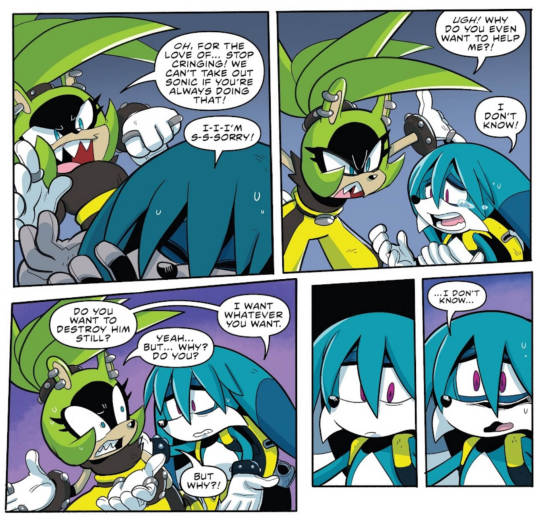

Like he said to Belle, he was made for Surge. And what he says directly after– "Sonic can use me, too." Kit doesn't even view himself as a person, only a tool– that's how far Starline's brainwashing went. It's clearly even affecting Surge, who realized in the latest issue, #72, how fast she and Kit fell into their abusive patterns again once Clutch took over– they were conditioned to be tools. Clutch claimed to want to help them, but really he was just using them for his own ends, just like Starline. So they went back to the familiar.

And speaking of familiar– pain is familiar to Kit, specifically pain in service to others. In his breakdown in #50, he says that Starline made him happy he'd been hurt. And in Imposter Syndrome #3 and #4, we see that him and Surge hate Starline and want to usurp him... but also are still trapped in the patterns he implanted in them. Surge still wants to kill Sonic and outperform everyone else. Kit still can't do anything but what she wants, to the point he becomes near catatonic when he believes she's dead.
Another pattern Kit is still trapped in is the idea that he has to be okay with his own suffering.

The only sense of home or family Surge and Kit have is in each other, but they fundamentally can't work together, at least as they are currently. Kit is expected to take Surge's anger, and Surge isn't expected to treat him like his own person.
And this, I think, is Kit's problem with Tails.
He was made to be Tails, and he knows this, but he can never have what Tails has. He can never live up to Tails and do what Tails can do, despite that being his entire life's purpose.
He doesn't hate Tails because he was programmed to– as he says to Surge, he only wants to destroy Sonic because she wants to. When he first encounters Tails, he refers to him as his target- a simple, unemotional term. He doesn't have the deep ingrained hatred for him that Surge does for Sonic.
Instead, he hates Tails because of what he sees in him. He sees Sonic and Tails interact, he sees how much Sonic trusts and relies on Tails, and he sees how he also loves and respects him. He sees how Tails has his own motivations and opinions, and he's experienced Tails's genuine compassion that was in part fostered by the hedgehog that raised him. In turn, Tails is loyal to Sonic, but not because he has to be– because he, in turn, loves Sonic and wants to be with him.
Kit only wants to be with Surge because he was forced to. Starline wanted to use Surge and Kit to stop Sonic and Eggman's cycle, but he made a whole new one instead. Kit is trapped in a cycle of pain, knows he's trapped in it, and is helpless to escape it.
Tails isn't, and Kit sees that in Tails. Subconsciously, he sees Tails and only sees how he fails to live up to his life's mission, and how he'll never have what Tails has.
After all, why would anyone bother with him? They already have Tails.
Is he a target? I like it here now.
#kit the fennec#kitsunami the fennec#idw sonic#sonic idw#sth#kit meta#kitsunami meta#sth meta#impostor syndrome#mine#connie writes
425 notes
·
View notes
Text
My last detour before actually getting to Phase Two involves jumping ahead to Phase 3--specifically the 2017 Annual, AKA "Soundwave Does a War Crime" AKA "Oh God, Put Your Helmet Back on, Soundwave".
(For the record. I didn't jump into the flashbacks in the OP comic because I didn't want to pick through that many issues I'd get to in a couple weeks anyway. Plus, it's my silly reread and I can read it in whatever order I'd like. If you've never read IDW and are gleaning information from it, unfortunately this series is less about Soundwave than I'm making it seem. I am simply being Academic about my blorbo. Again, not much meta for this issue, since it's just setting up some things for Phase 2-3)
First things first

I love Hubcap! I'm sure glad nothing bad ever happened to him!
However, I find it Interesting that Hubcap ends up associated with yet ANOTHER person who is being coerced into doing terrible things. I'm so glad he made it out of IDW unscathed :) I really liked how he made it to Sanctuary Station and he and Soundwave became such good friends!
Anyway. I refuse to insert a screencap of Peeled Soundwave onto this post, so please use your imagination.

Note to self: make a meta post later about IDW shockop and IDW wavewave

I know OP isn't exactly a reliable narrator, but Man, I Really Don't Think They Did. While I was briefly tempted to make another 'worst boss' poll just for this issue, Soundwave will both be in the running later! I'm thinking a seven-way showdown to take us through Dark Cybertron, after which the worst bosses will thin out considerably since, well, most of them will either be dead or in a new series.
(Again for the record, while I like to hate on Optimus I actually really enjoy him as a character.)
This week, stay tuned for: meta on Soundwave's abilities! My Opinion that Ratbat should've been a long-term antagonist! Soundwave Really Didn't Learn To Not Mess With People's Minds ft. John Barber Retroactively Making My Boy Catholic! a masterpost of various gay things Soundwave says! Soundwave & Tarantulas (+ Prowl): We Sure Do Love Psychological Torture! Why exrid is harder to get into than MTMTE! and more!
7 notes
·
View notes
Text
sorry, still thinking about whirl. imo the most important characteristic whirl has in MTMTE isn't the obvious ones. it's not that he's an asshole, it's not that he's funny, it's not that he's violent, it's not that he's done terrible things, it's not that he hates himself. all of those are important, and they're usually the immediately obvious traits that stick out panel to panel. but they're not what drives the narrative function of the character most across the whole run of the comic.
imo the thing that most defines the engine driving whirl's narrative function is that he is astute and perceptive. it doesn't come up in obviously quotable panels moment to moment, but the way his arc interacts with the overall arc of the comic is that whirl is the one who sees through a lot of the bullshit that's going on and the way he acts and the decisions he makes overwhelmingly rely on that knowledge. unlike most characters, his decisions are rarely defined by the emotional intensity of his own investment in this or that thing (an interpersonal relationship, an insecurity, a need to prove something) but instead by his sharp awareness of the dynamics of the people around him.
whirl knows the score with rodimus and what the whole mess that is their 'mission' is really about- or rather, what it isn't about, not really. he does not take it seriously because he understands in a very real way, it's just not serious, it's an excuse. whirl knows the score with cyclonus and tailgate and when to intervene in that whole mess instead of being kind about it. whirl understands what getaway is doing and where it's leading and that both makes his decision to initially back getaway's plan both an asshole move but also a decision made with total clarity, in contrast to almost everyone else who makes that decision. whirl knows how to get past drift's act and gets a punch in the face for it, because he smells the bullshit there immediately. whirl is not unaware of the social dynamics on the LL at all; he is choosing to be as abrasive and inhospitable as he usually is on purpose with full knowledge of what he's poking at. whirl gets to the supposed afterlife and immediately knows it cannot possibly be real!
unlike basically every other major character, there's really no point whirl makes a decision with his judgement meaningfully clouded by something. he has a strong interiority and motivations, absolutely, but above all else he is making every decision, no matter how bad or self destructive, with a level of genuine awareness and clarity that is pretty much unique, and his assessment of everyone and everything around him is pretty much unmatched if you read between his constant pisstaking. it's fantastically good, and what makes him a completely essential part of the ensemble all the way through the comic's run. nobody else can be so consistently relied on to respond to the situation presented to him as it is. (cyclonus is really the only person in the cast who recognises this, i think, and it explains why they wind up perfectly matched. see again: whirl's interventions with him and tailgate.)
315 notes
·
View notes
Text
the confrontation between starscream and megatron in All Hail Megatron, is a concise way of showing their idealogical split and conflict between the two of them. it tackles the root of their issue immediately, by beginning the conversation with starscream sarcastically complimenting megatron's conquest, only to be met with sincerity from his leader. he was not seen, nor taken seriously as the second-in-command, despite his warning that there would be traitors after this victory. his voice was heard but not listened. he was treated like a petulant novice.
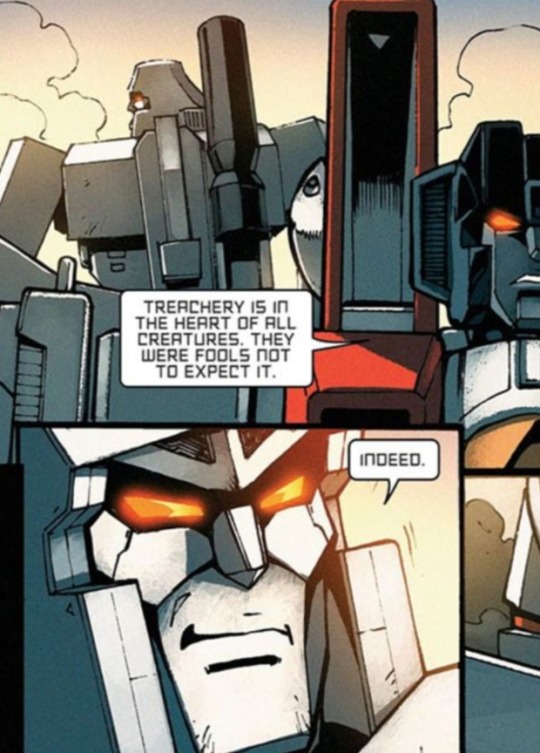
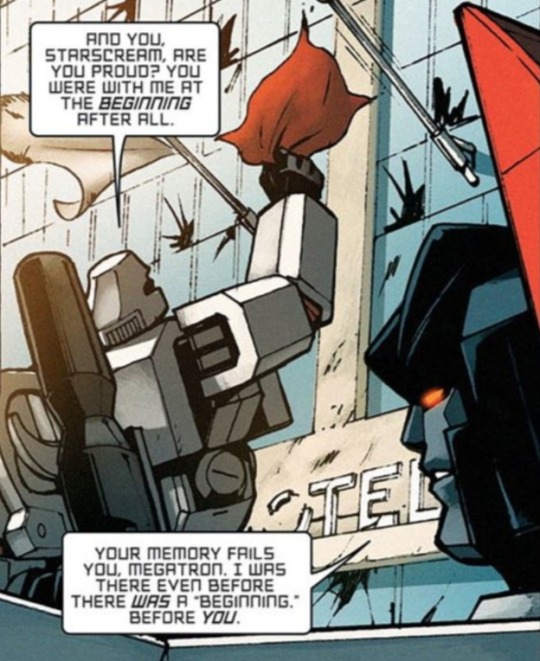
"your memory fails you, megatron. i was there even before there was a beginning. before you."
it came to a point where starscream reminded megatron of his position in the decepticon. he's not a confused, easily impressed warrior that megatron seemingly like to think. he has been fighting for the decepticon cause even before megatron came into the picture.
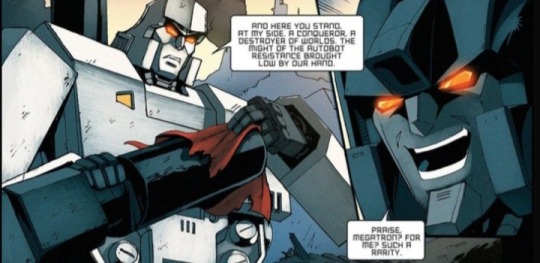
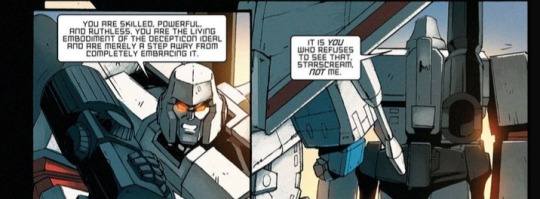
the wounds deepened when megatron disregard his words, and instead, attempt to appease starscream by complimenting him and compares him to a true decepticon. which, if anything, is a fucking insult to starscream as he's been reduced into a poster for the faction, and nothing more. yes, he does fight for the decepticon and he is willing to be the face of it, but megatron patronized him into a mere accessory.
which ironically led starscream to fulfill the prophecy on his own. he gather his own ally with his loyalist by his side, in order to usurp megatron.
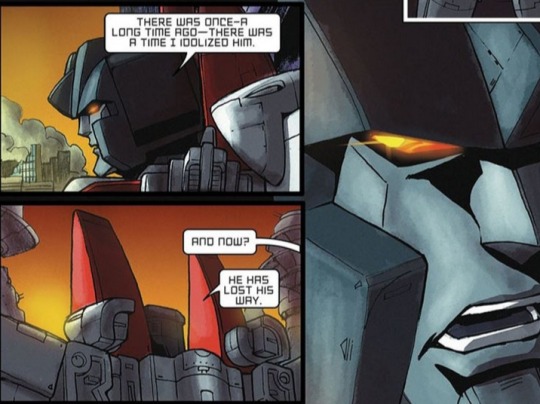
it's interesting to see the source that cause the friction in their partnership. it was layered with secrecy for millennials, and starscream felt underestimated by megatron's perception of him, and megatron withhold too many information from his own second-in-command. there was no respect in this teamwork. there's an imbalance between the two of them which led starscream to distrust megatron and his objective for the decepticon.
#transformers#transformer#transformers idw#tf idw#transformers meta#tf meta#maccadam#starscream#megatron#megastar#they are so macbeth coded it's insane
135 notes
·
View notes
Text
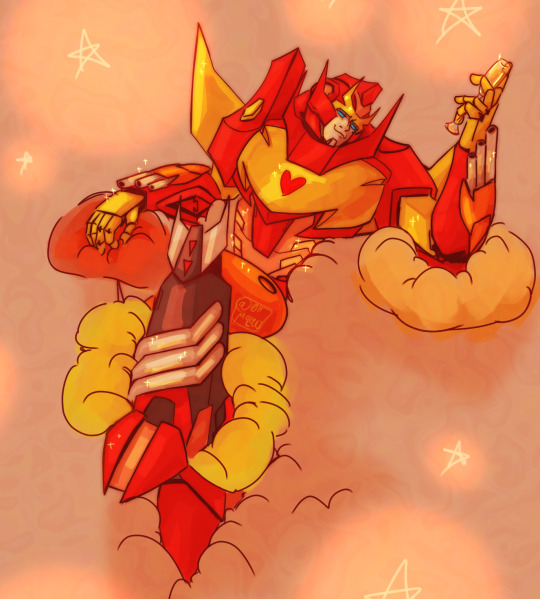
Rodders <3
#surprisingly recent#I'll be remembering to update my queue now that meta ai is taking over fr now#i have so much stuff hehehehe#BUT i am officially an ipad kid. shout-out to Facebook Marketplace ily#i am now SO much broker BUT i am planning on turning these into prints!#okay goodnight pookies <3#its tag time#transformers#mtmte#more than meets the eye#lost light#rodimus#rodimus prime#idw#transformers idw#maccadam#maccadams#digital art#procreate#transformers fanart#ohmellow
278 notes
·
View notes
Text
I’ve been scrutinizing the badges and medical symbols (or lack thereof) of the medics of IDW, and speculating about what these might say about each of them.
Out of all the medics, Flatline’s badge(less) arrangement stood out to me, so it’s time to make this way deeper than the writers and artists intended.
To wear a badge, or not to wear a badge…
Thanks to Alex Milne, the Autobots got their own medical cross:
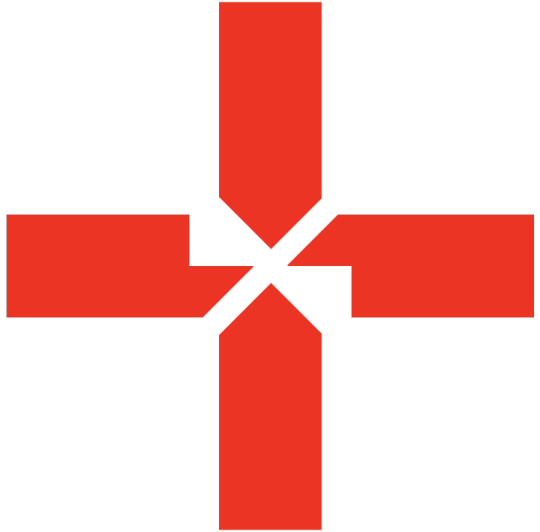
This is worn by Pharma and First Aid, and by Ratchet before the war and during the earliest days of the conflict. He later removes the cross, but switches between a couple of different symbols and no symbol throughout the course of the war—his time spent on Earth having a lot to do with that, I suspect. Even so, after the war, he chooses not to wear any indication of his status as a medic—only an Autobot badge.
Meanwhile, the Decepticons have no universally recognized symbol for their medics. Instead, they each have their own unique symbol, or none at all. Glit has a vaguely medical-looking cross that differs from the Autobot medical cross, and Flatline has a symbol resembling the pulse of a spark:
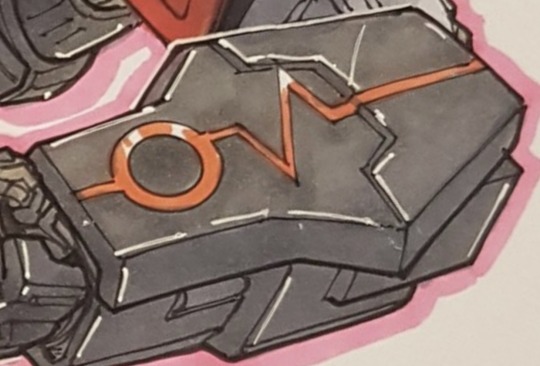
…which I can only assume is meant to be the Cybertronian version of the following, but with a circle for the spark instead of a heart:
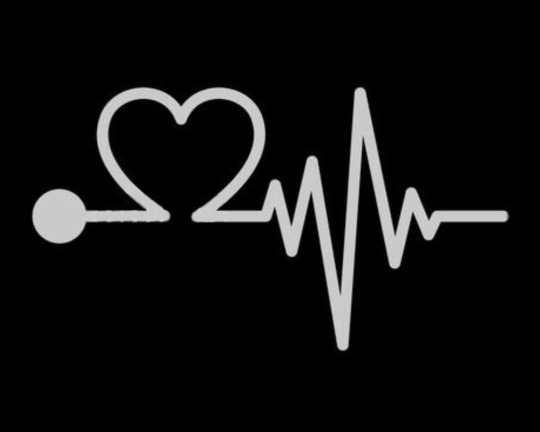
Meanwhile, Spinister and Nickel have nothing. Just their Decepticon badges.
Now, to combine these with faction badges:
Badge + medical symbol: Pharma, First Aid
Badge + no medical symbol: Ratchet, Fixit, Velocity, Spinister, Nickel
No badge + medical symbol: Flatline, Glit
No badge + no medical symbol: Ambulon
There are three medics who don’t wear badges; all of them are or were Decepticons. This is interesting on its own, but I’m more interested in how this may correlate to their attitudes towards treating Autobots:
Even though Glit’s KP version is willing to treat people regardless of faction, this is never confirmed for his IDW version. There isn’t enough evidence to infer how he feels about Autobots, or treating them. Yes, he was at Grindcore, but that says nothing about how he treated Autobot prisoners behind the scenes.
As for Ambulon, he switched sides and underwent the Act of Affiliation, but—evidently—not the Rite of the Autobrand. I could speculate all day about why, but that’s not important because, whatever the case, he treats patients of both factions without hesitation. Because he’s been on both sides, he has an externally observable reason to do so.
This leaves Flatline as the only badgeless—and only Decepticon—medic who’s proven to uphold a moral value of treating people regardless of faction. Unlike Ambulon, he has no externally obvious reason to do so, but he does it anyway because it’s personally important to him.
The following roams into headcanon territory, but based on what can be inferred from Flatline’s few appearances, I like to think his choice to not wear a Decepticon badge serves two purposes:
It’s his way of signaling to potential patients: “I don’t see you through the lenses of your faction and ideology, but as a person.”
It’s a personal reminder for himself of his commitment to being blind to factions when treating people; it’s a way of reminding himself he’s committed to the preservation of life first—not to any group or “order” of medical personnel.
This is not to say medics who do wear badges and belong to an order of medics don’t also treat patients based on similar values—as we see First Aid and Ratchet treating people of the opposing faction.
This is just me playing around with the possibility of inferring something deeper about Flatline’s character—what he values, how he sees himself and the world, what sets him apart from others “like him,” etc.
And besides, Autobot medics are expected to uphold their medical oaths. Decepticon medics—perhaps unfairly—are assumed to be lax in that area, so it means more to have a Decepticon medic who holds to their personal moral values despite the general attitude towards the enemy seen in many of their comrades.
On that note, I would love to know how Tarn sees Flatline…
A Decepticon who refused the Rite of the Deceptibrand.
A Decepticon who refused to cut into his spark casing to signify his commitment to the Cause.
A Decepticon who values commitment to his personal morals above adhering to any external ideology.
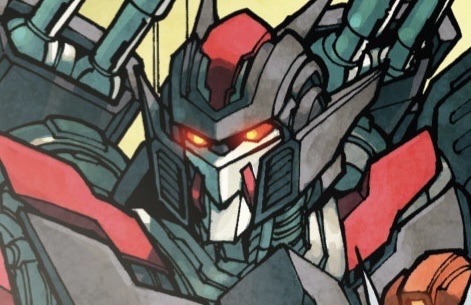
#idw transformers#maccadam#idw1#tf idw meta#tf idw character analysis#idw flatline#dr. dark mode#nova’s nerding out again
155 notes
·
View notes
Text
Okay interesting detail I just noticed.
Surge is green, the same color as Sonic's eyes.


Kit is blue/teal, the same color as Tails's eyes.


Dunno if that's on purpose but it's interesting.
So I think that if Starline had created an anti-Knuckles, they should be purple, like Knuckles's eyes.
#also i just feel like an anti-Knuckles should be a porcupine#that's the closest thing i can think of to a “fake” echidna#I'm about two seconds away from creating an oc lol#but if anyone wants to use that concept go for it#surge and kit#sonic and tails#surge the tenrec#kit the fennec#sonic the hedgehog#tails the fox#miles tails prower#meta#sonic idw
72 notes
·
View notes
Text
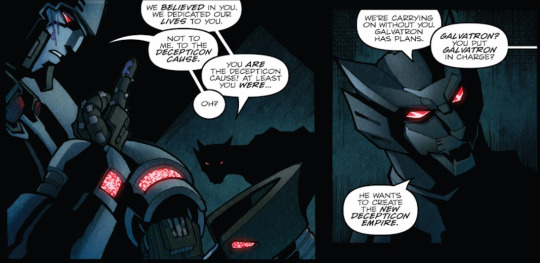
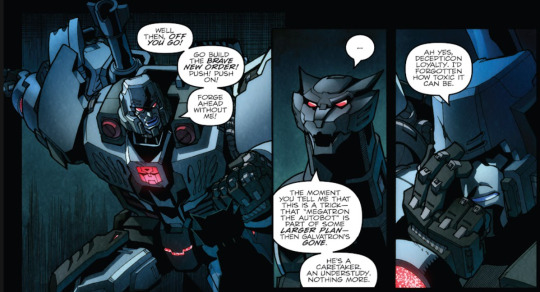
slaughterhouse posting part 2 that isn't going to be polished at all and has been sitting in my drafts for days, but this scene is so interesting to me because i genuinely have no idea what megatron wants from ravage in this interaction- and i don't know if megatron knows, either.
megatron starts out by saying that the decepticons' loyalty isn't to him- its to the cause. ignoring how this is immediately striking me as completely, blatently wrong due to the times we see megatron rallying the decepticons around himself when other leaders fail to do the same (nevermind the fact that he started the cause in the first place), he then gets angry with ravage when ravage confirms that- yeah, actually. you're not the cause anymore. we have moved on with someone new. megatron gets so angry he stands up, he looms over ravage, he raises is voice and balls his fist- and why else would he do this if he wasn't upset that they're moving on without him?
which would, of course, make megatron a hypocrite. he left the decepticons and refused to take any effort to rejoin them- he clearly doesn't actually want to return to the fold. but when the decepticons unite themselves and move on from him, it's different. i can abandon you, but you cannot abandon me.
i've always took this reaction as being an immediate, no thinking, gut reaction to finding out the decepticons are moving on without him. he's angry, potentially feeling betrayed by them, when he... doesn't have much of a right to feel that way. and it's not like megatron wasn't given an option to join the decepticons again if that's what he actually wanted.
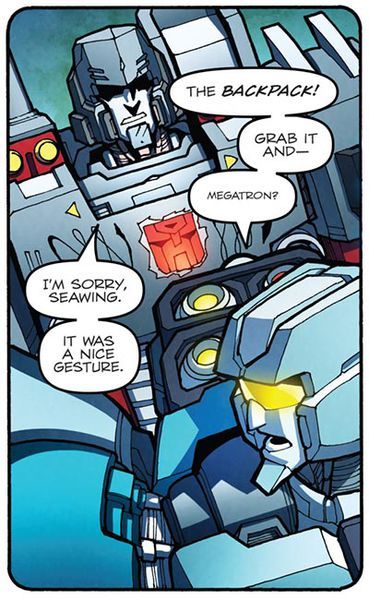
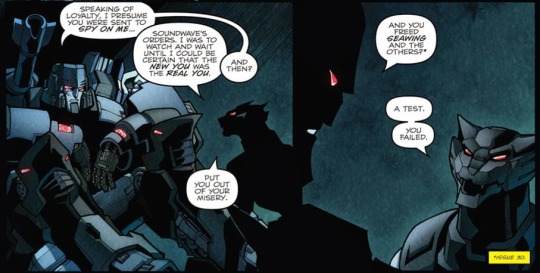
he was given a choice. he turned it down. he could of turned it down for any number of reasons, but no matter the reason, the point remains that he turned it down.
going back to panel after megatron snaps, ravage clearly takes megatron's outburst as him being upset that they've moved on without him. despite the aggressive way this interaction started with ravage attacking megatron, ravage spends most of this conversation attempting to reassure megatron. megatron gets angry that galvatron took over and they're moving on without him? okay- so then he wants to come back, right? he's upset he's been replaced?
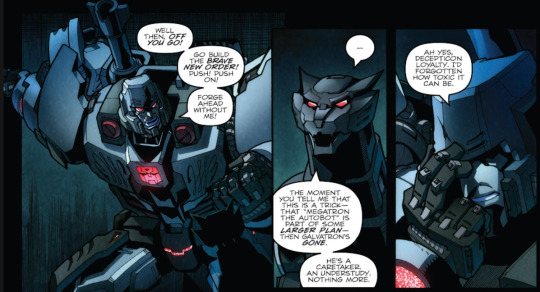
well, galvatron isn't permanent. say the word and you'll be back in charge. megatron says that the decepticons aren't loyal to him, ravage reaffirms that they were loyal to him but now they've chosen a new leader since he left, megatron gets angry that they're moving on without him, and then ravage reinforces their original loyalty to him by saying if he wants to come back, they'll follow him.
and then megatron turns it around; yes he was just angry that the decepticons were no longer loyal to him, but now that same loyalty is toxic, actually. and it is! it absolutely is toxic. but i think ravage backed him into a corner here, even unintentionally. he can't sit down and actually address why the decepticons moving on makes him angry without admitting some part of him wants to return to the cons. or at the very least he still feels possessive of them and doesn't want them to function outside of his influence. when given the option to rejoin, he responds by insulting the decepticon's (and ravage's!) sense of devotion/loyalty and then quickly changes the topic to seawing and the trial. he doesn't say a solid yes or no answer because he doesn't actually have one to give.
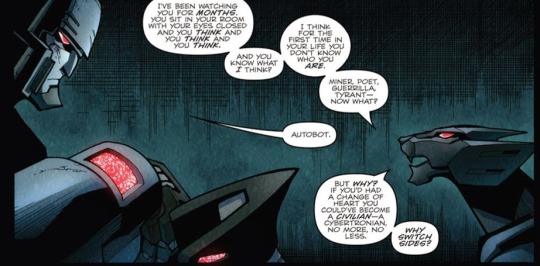
ravage nails it down anyways. megatron has no idea what he wants from ravage in this interaction because he doesn't know where he stands anymore, let alone what he wants for himself. before ravage was revealed to be on the lost light, megatron was captain. he even seems content to BE captain- but ravage makes it complicated. ravage is a direct reminder of who he used to be and the people he used to surround himself with. worse, people he's abandoned and hurt in order to get to where he is as captain now. megatron left the decepticons behind with no command structure, no guidance, no plan- and ravage's mere presence is a bitter reminder that even if he's run off to the autobots, he can't escape that.
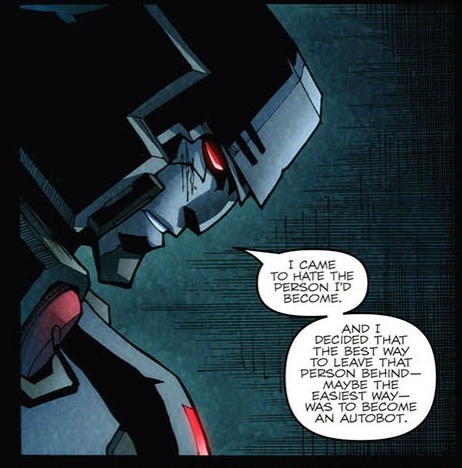
he's settled into a state of stagmentation with the autobots. one he's content with, maybe- at the very least one he can live with where the guilt isn't as heavy. it is the easiest way out megatron saw for himself.
but if anyone can get him to doubt himself, well.

who else better than ravage to stir up the past?
#blight rambles#blight's meta#transformers#maccadams#maccadam#mtmte#more than meets the eye#transformers idw#idw transformers#idw tf#tf idw1#transformers idw1#idw2005#tf idw#ravage#mtmte ravage#tf ravage#transformers ravage#idw ravage#megatron#idw megatron#mtmte megatron#tf meta#transformers meta#this post is very messy and i debated a lot on posting it bc. idk if it even reads well or if my view on this scene isnt completely biased#because of how much i like ravage#but uh take it anyways. i cannot stop thinking about the slaughterhouse scene#i WISH. i wish their dynamic stayed fucked up. i wish they stayed angry and uncomfortable with each other#i wish ravage having to reassure and comfort megatron while ignoring his own pain was an intentional writing choice and not just#well. what we got in canon. where ravage is megs' support and thats it
198 notes
·
View notes